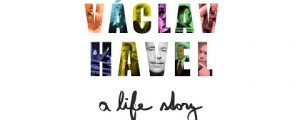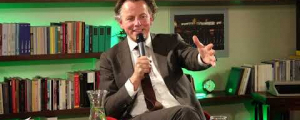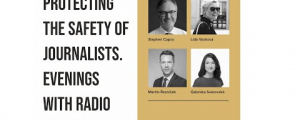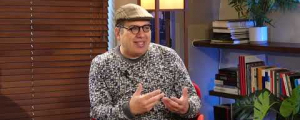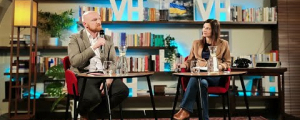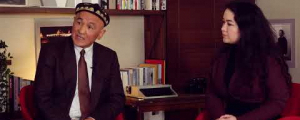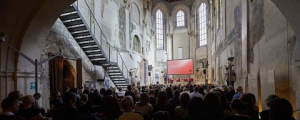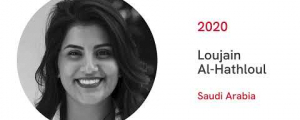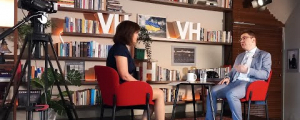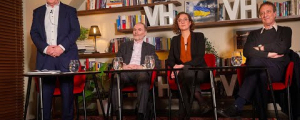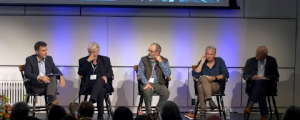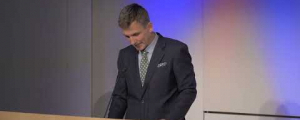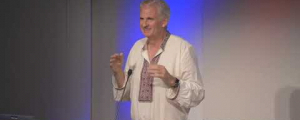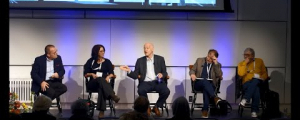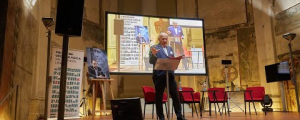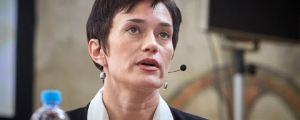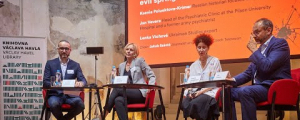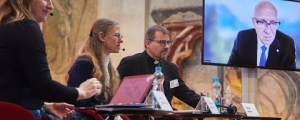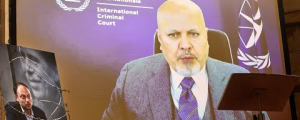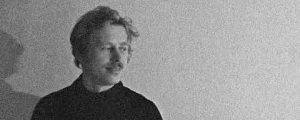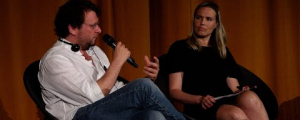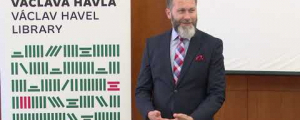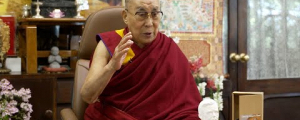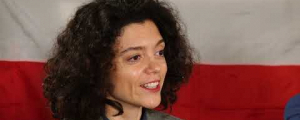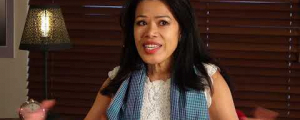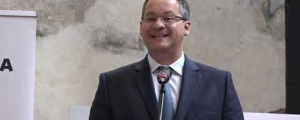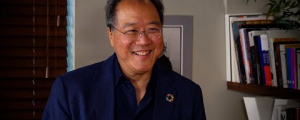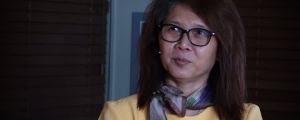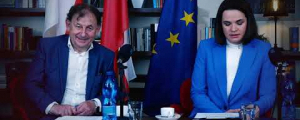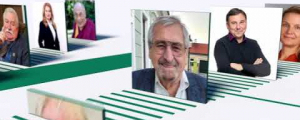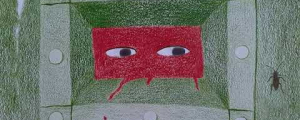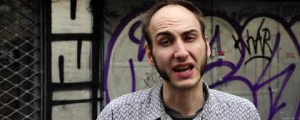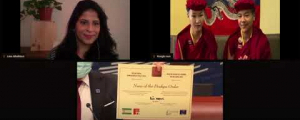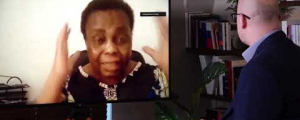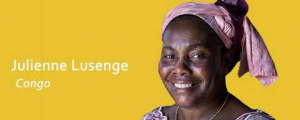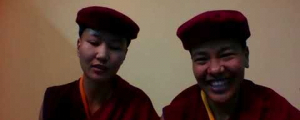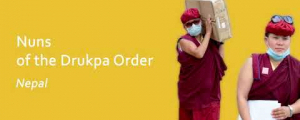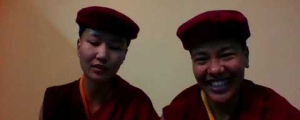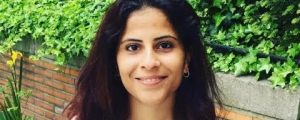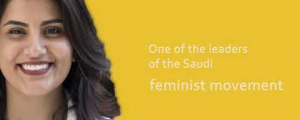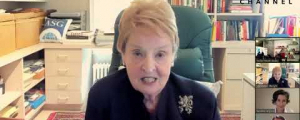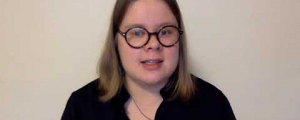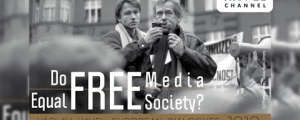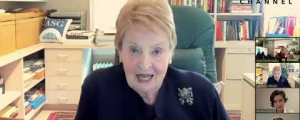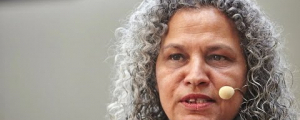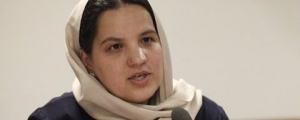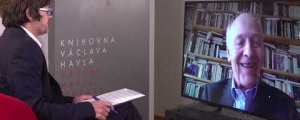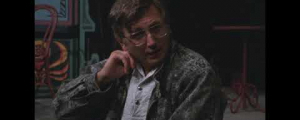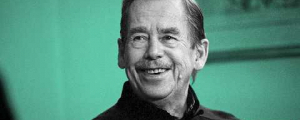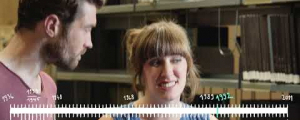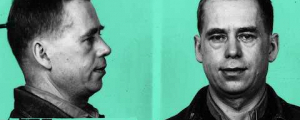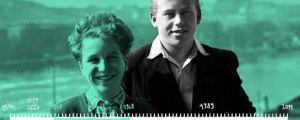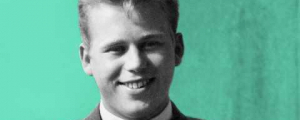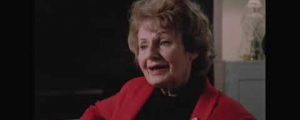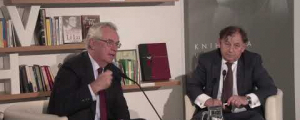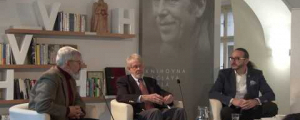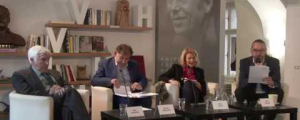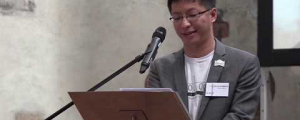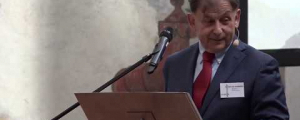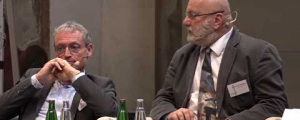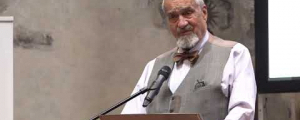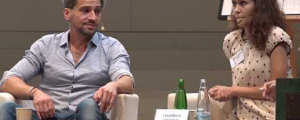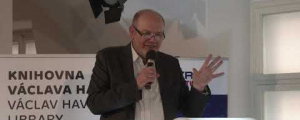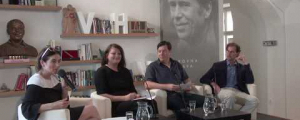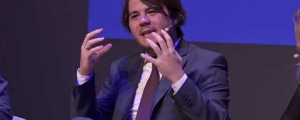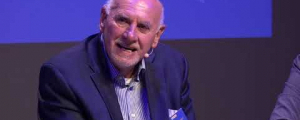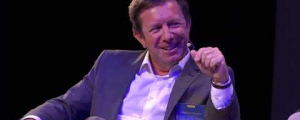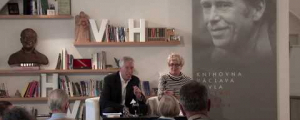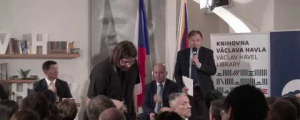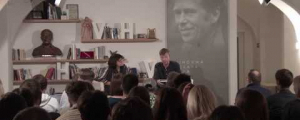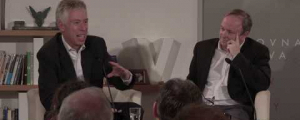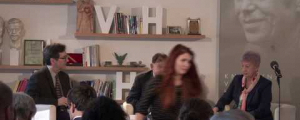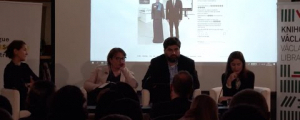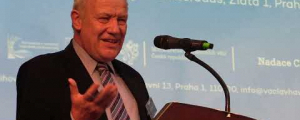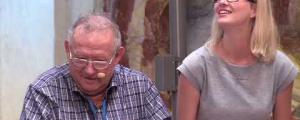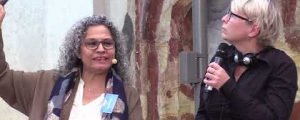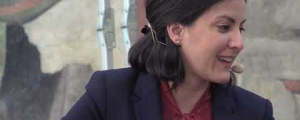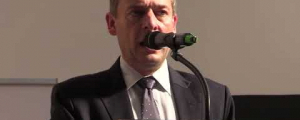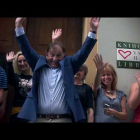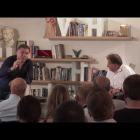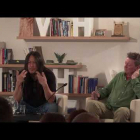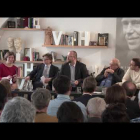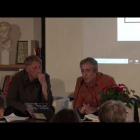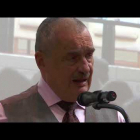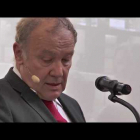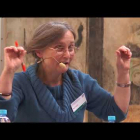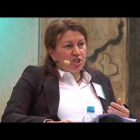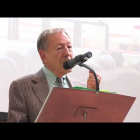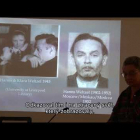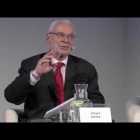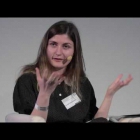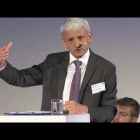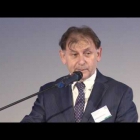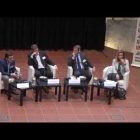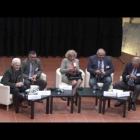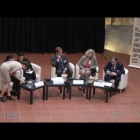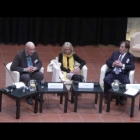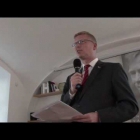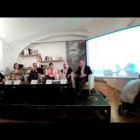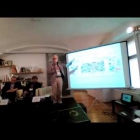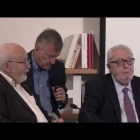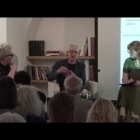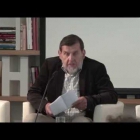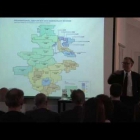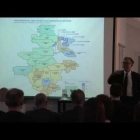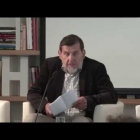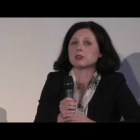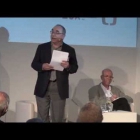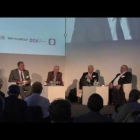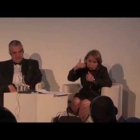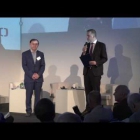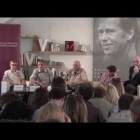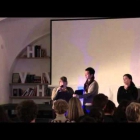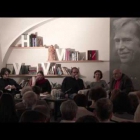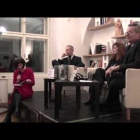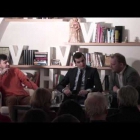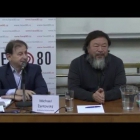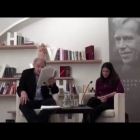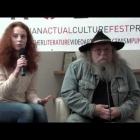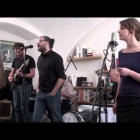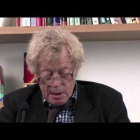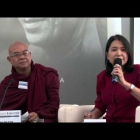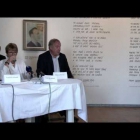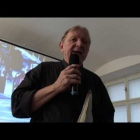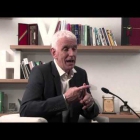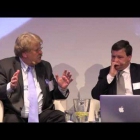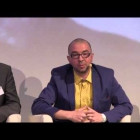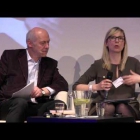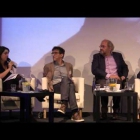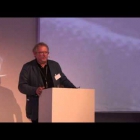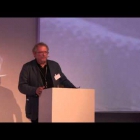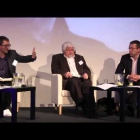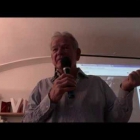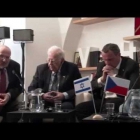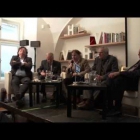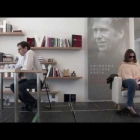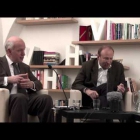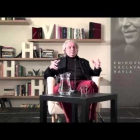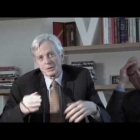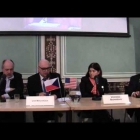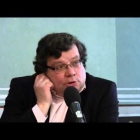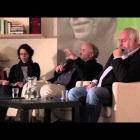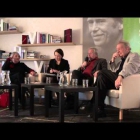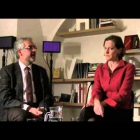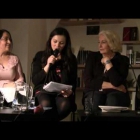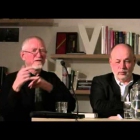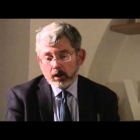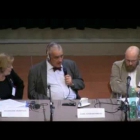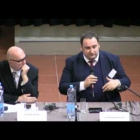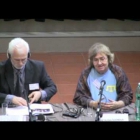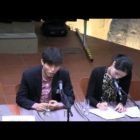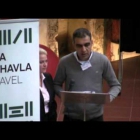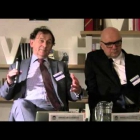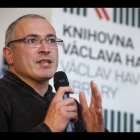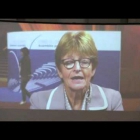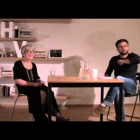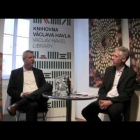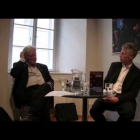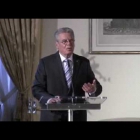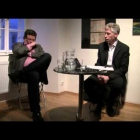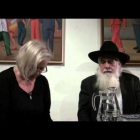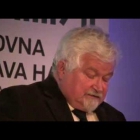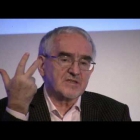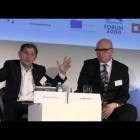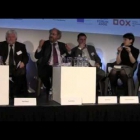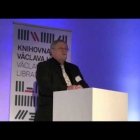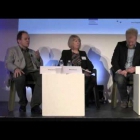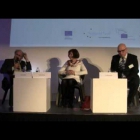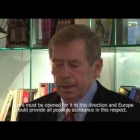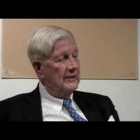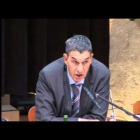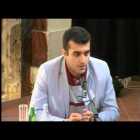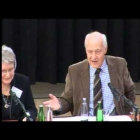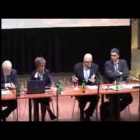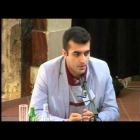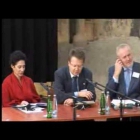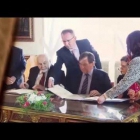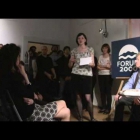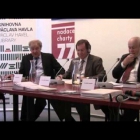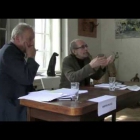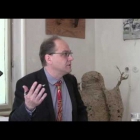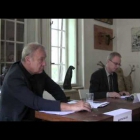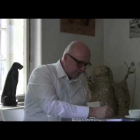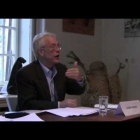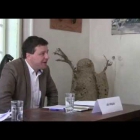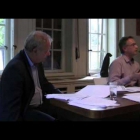Videos
Václav Havel || A life story in 8 minutes
From his childhood steps through his first artistic achievements and months and years in opposition to the communist regime, to his election as president of Czechoslovakia and then the Czech Republic, as a film director, and as a tireless defender of human rights and civil society.
The story – which is also a chronicle of the second half of the (Czech) 20th century – is narrated by journalist Ian Willoughby.
Directed and animated by Jakub Čermák.
In Conversation With... Bert Koenders
A discussion on the enduring legacy of Max van der Stoel and the pivotal role of dissidents in shaping democracy in the 21st century. Max van der Stoel's historic meeting with Jan Patočka, the philosopher and spokesperson for Charter 77, marked a significant milestone in the struggle for human rights and political freedoms. As the first Western minister to engage with Charter 77, van der Stoel's courageous act paved the way for international recognition of dissident movements.
Against the backdrop of this historic encounter, esteemed speaker Bert Koenders, Chair of the Max van der Stoel Foundation and former Dutch Minister of Foreign Affairs, led a conversation on the challenges and opportunities facing democracy today together with professor emeritus at the University of Fribourg Filip Karfík. Professor Karfík studied philosophy in a private circle of Jan Patočka’s students, classical philology studied in Prague and Vienna, postgraduate studies in Paris, Eichstätt and Munich, PhD in philosophy obtained at the Faculty of Arts, Charles University in Prague, habilitation achieved in philosophy.
Ian Willoughby discussed with guests.
Protecting the safety of journalists. Evenings with Radio Free Europe
Press freedom and independent media are increasingly under pressure. Currently, according to Reporters Without Borders, almost 500 journalists are behind bars for simply doing their jobs and journalists around the world work under constant threat to their personal safety and often to the safety of their families too. Free media are a cornerstone of fair and democratic societies. Independent journalism serves as an indicator of democracy and enables citizens to make informed decisions about their lives. Join the Václav Havel Library and Radio Free Europe / Radio Liberty for a discussion on the safety of journalists at a time when a record number of journalists are imprisoned and facing increasing physical and online harassment.
Speakers include:
* Stephen Capus, President and CEO, Radio Free Europe / Radio Liberty
* Lída Vacková, Program Manager, Freedom House
* Martin Řezníček, Deputy Editor-In-Chief of News, Czech Television
Moderator: Gabriela Svárovská, Expert on Human Rights and International Politics
In Conversation With.. Edward Einhorn
In a wide-ranging interview, New York-based theatre director and playwright Edward Einhorn discusses putting on all Václav Havel's plays within a 2006 festival in New York, his own interactions with the playwright-turned-president, where Havel's work stands in relation to the Theatre of the Absurd in general, his own work as artistic director of the Rehearsal for Truth festival (co-run by the Václav Havel Centre) and much more.
In Conversation With... Matt Field
In little over a year, the UK’s ambassador to Prague, Matt Field, has become perhaps the most recognisable foreign diplomat in the Czech Republic. But what does he regard as the most important aspects of his mission in the country? How does he view Czech-British relations in 2024? And what are the values he is most keen to promote in his position?
Matt Field discussed these questions and more with Tereza Willoughby, head of arts news at public broadcaster Czech Television.
In Conversation With... is a series of occasional talks in English at the Václav Havel Library.
Free Ilham Tohti || An Interview with Jewher Ilham and Enver Can
lham Tohti is a publicly known Uyghur intellectual from China and the laureate of the Václav Havel Human Rights Prize for 2019. For over 20 years he has been engaged in developing dialogue and understanding between the Uyghurs and the Chinese. For this, he was sentenced to life in prison in a two-day rigged trial in 2014.
The 10-year anniversary of his unjust imprisonment was marked at the Václav Havel Library by an interview with Ilham Tohti’s daughter Jewher Ilham and Enver Can, Ilham Tohti’s tireless defender and president of the IlhamTohti Institute.
Women in War (Václav Havel Human Rights Prize Conference 2023)
11th international conference in honour of the laureate of the 2023 Václav Havel Human Prize
Held under the auspices of the wife of the Czech president, Eva Pavlová
- Date: Tuesday, October 10, 2023
- Venue: Prague Crossroads, Zlatá 1, Prague
- Organisers: Václav Havel Library & Charta 77 Foundation
- Partners: Parliamentary Assembly of the Council of Europe
- Media Partners: Czech Television, Radio Free Europe / Radio Liberty, Heroine
I regard as a true hero somebody who overcomes their fear because they know it’s the correct thing to do. A person who listens to their conscience, which tells them it would be right to do something. Even though reason tells them that it may be dangerous for them. (Václav Havel, 1995)
Conference Programme
Welcome
- Lejla Abbasová, conference moderator
- Vocal performance by Ukrainian children aged 8–15, Kroky Dobra charity organisation
Conference Opening
- Gabriel Eichler, Chairman of the Board of Trustees, Václav Havel Library
Interview with Osman KAVALA the 2023 Václav Havel Human Rights Prize laureate
-
Osman Kavala – Businessman, human rights defender, philanthropist and political prisoner convicted to an aggrevated life sentence (Turkey). Mr. Kavala was represented at the conference by Jakub Szántó
-
Chair: Barbora Kroužková – Journalist and presenter, Czech Television
- Vocal performance by Ukrainian children aged 8-15, Kroky Dobra charity organisation
Panel I: Discussion with 2023 Václav Havel Human Rights Prize finalists
-
Justyna Wydrzyńska – Abortion doula and activist fighting for women's rights (Poland)
-
Yevhen Zakharov – Human rights defender and the founder of the Ukrainian Helsinki Human Rights Union (Ukraine)
- Chair: Barbora Kroužková – Journalist and presenter, Czech Television
Panel Keynote
- Petra Procházková, Journalist, humanitarian worker and war correspondent from conflict areas of the former Soviet Union
Panel II: Face to Face with Evil
- Ivana Krejčová – mother of Taylor, a Czech medic and founder of the Phoenix Project who died in May 2023; the organisation’s members teach combat medicine to Ukrainian soldiers and help transport and treat the wounded on the front line (Czech Republic)
- Julienne Lusenge – human rights activist recognised for her advocacy for victims of sexual violence in war (Congo)
- Moderator: Maryana Drach – Director, Ukrainian Service, Radio Free Europe/Radio Liberty
Panel Keynote
- Guzel Shamilyevna Yakhina, Russian author and screenwriter
Panel III: Rising from the Ashes
- Janina Hřebíčková – ambassador, diplomat, ex-peace negotiator and director of strategic communications on United Nations peacekeeping teams, KFOR and the International Organization for Migration (UN), former head of OSCE missions to the Western Balkans and the Middle East (Czech Republic)
- Vedrana Pribačić – director and journalist, screenwriter and director of the documentary Bigger Than Trauma, mapping the traumatic stories of women in the war in the former Yugoslavia (Croatia)
- Chair: Una Čilić – Digital Broadcast Editor, Radio Free Europe/Radio Liberty, Balkan Service (Bosnia and Herzegovina)
Acknowledgments
- Karolína Stránská – acting director of the Václav Havel Library
- Jolana Voldánová – director of Nadace Charty 77
Václav Havel Human Rights Prize Laureates 2013-2022
Laureates of the Václav Havel Prize for Human Rights for the years 2013-2022, awarded by the Parliamentary Assembly of the Council of Europe in cooperation with the Václav Havel Library and the Charter 77 Foundation. For more information visit us via: https://www.vaclavhavel.cz/en/vh-prize/history-of-the-prize
Polish historian and political scientist Łukasz Adamski in an interview with Zuzana Hocková
“Russia does not fit into the category of civilized nations. When you send arms which can castrate men or cut off the heads of Ukrainian soldiers (and we saw such examples in this war), then this is not civilization, it’s barbarism,” says Polish historian and political scientist Łukasz Adamski. As a guest speaker at this year’s jubilee 10th international conference of Václav Havel European Dialogues “Europe in a clash of two worlds”, Adamski reflects on Russia’s current aggression in Ukraine. In an interview with Zuzana Hocková, he speaks about the disunity of Western Europe, the clash of civilizations, the shared history of Poland, Lithuania and Ukraine, whose Polish-Lithuanian Commonwealth once served as a “rampart against tyranny from the East” and which since 2020 has been revived in the Lublin Triangle regional alliance.
“Russia does not fit into the category of civilized nations. When you send arms which can castrate men or cut off the heads of Ukrainian soldiers (and we saw such examples in this war), then this is not civilization, it’s barbarism,” says Polish historian and political scientist Łukasz Adamski. As a guest speaker at this year’s jubilee 10th international conference of Václav Havel European Dialogues “Europe in a clash of two worlds”, Adamski reflects on Russia’s current aggression in Ukraine. In an interview with Zuzana Hocková, he speaks about the disunity of Western Europe, the clash of civilizations, the shared history of Poland, Lithuania and Ukraine, whose Polish-Lithuanian Commonwealth once served as a “rampart against tyranny from the East” and which since 2020 has been revived in the Lublin Triangle regional alliance.
The Velvet Revolution, the Current Crises and the Future of Liberal Democracy. A Patočka Debate
In the days following November 17, 1989, the Czech and Slovak citizens took responsibility for the destiny of their country and embarked on decades of a dramatic and largely successful transformation. From this perspective, the perfect storm of recent crises, from the COVID pandemic through Putin's aggression against Ukraine, the energy crisis and the disruption of globalization chains and processes, together with the challenges of the democratisation of knowledge and the advent of the ‘postfactual era’, can be seen as different symptoms of a single crisis of responsibility that Václav Havel predicted in his address to the US Congress more than thirty years ago.
On the eve of the anniversary of the Velvet Revolution, two of its eye witnesses and sympathetic observers, historian Timothy Garton Ash, professor of European Studies at Oxford University, and journalist Misha Glenny, recently appointed rector of the Institute for Human Sciences in Vienna, together with Professor of political sociology Anna Durnova of the University of Vienna, shared their thoughts on the velvet heritage, the crisis of liberal democracy, the legacy of Václav Havel with moderator Michael Zantovsky and the audience.
The Havel Albright Transatlantic Dialogues: Havel and Our Crisis - The Crisis of Truth
Expanding on earlier program, subsequent roundtables focused on Havel’s concept of truth and on his practice of kindness. Participants discussed them against the background of contemporary politics of disinformation and hatred.
The Crisis of Truth
Guests: Jacques Rupnik, James Le Sueur, Timothy Snyder, Paul Wilson
Moderator: Milan Babík
The Crisis of Kindness
Guests: Wendy Luers, Martin Putna, Marci Shore, Vladimir Tismăneanu
Moderator: Daniel Konrád
The Havel Albright Transatlantic Dialogues: Havel and Our Crisis - Keynotes
During the opening night, Milan Babík kicked off the event with recollections of his one and only encounter with Václav Havel. Jan Havránek then conveyed a brief message of greetings on behalf of the Czech Republic. In the highlight of the evening, Michael Žantovský delivered the keynote address.
Welcome Message: Encountering Havel, America, and Freedom
Milan Babík
Greetings from the Deputy Chief of Mission, Embassy of the Czech Republic, Washington, DC
Jan Havránek
Keynote Address
Michael Žantovský
The Havel Albright Transatlantic Dialogues: Thinking Truth and Freedom with Havel and Zelensky
In the spotlight lecture, Timothy Snyder delivered a captivating meditation on the nature of freedom. In it he tied Havel’s idea of “living in truth” and the tradition of dissent from the 1970s and 1980s to the present war in Ukraine and Volodymir Zelenskyi’s courageous stance in the face of Russian aggression.
The Havel Albright Transatlantic Dialogues: Havel and Our Crisis - The Crisis of Values
Initial roundtables were dedicated to the crises of values and language. Drawing on their different backgrounds, participants discussed not only Havel’s principles and ideas, but also their relevance to current developments such as the war in Ukraine.
The Crisis of Values
Guests: Jacques Rupnik, Marci Shore, Vladimir Tismăneanu, Michael Žantovský
Moderator: Josef Pazderka
The Crisis of Language
Guests: Martin Putna, Timothy Snyder, Paul Wilson, Michael Žantovský
Moderator: Daniel Konrád
Crime and Punishment | Closing Remarks | Václav Havel Human Rights Prize Conference 2022
The jubilee 10th international conference in honour of the laureate of the 2022 Václav Havel Human Prize | Crime and Punishment : Crimes against peace and humanity and the wheels of justice Closing remarks: Martin Palouš – Diplomat, teacher, Charter 77 signatory and human rights advocate
Crime and Punishment | Evgenia Kara-Murza & Panel I | Václav Havel Human Rights Prize Conference 2022
The jubilee 10th international conference in honour of the laureate of the 2022 Václav Havel Human Prize | Crime and Punishment : Crimes against peace and humanity and the wheels of justice 0:00 Interview with the 2022 Václav Havel Human Rights Prize laureate Evgenia Kara-Murza – wife of Vladimir Kara-Murza a political prisoner and leading Russian democracy campaigner Chair: Michael Žantovský – Václav Havel Library 27:28 Panel I: Discussion with 2022 Václav Havel Human Rights Prize finalists Denys Rabomizo – War Crimes Documentation and Database Coordinator and Member of Secretariat of the coalition of civil society organisations 5 AM Coalition (Ukraine) Áaron Demeter – Representative of Rainbow Coalition defending LGBTQIA+ rights (Hungary) Chair: Linda Bartošová – Journalist and moderator
Crime and Punishment | Panel III: Where does evil spring from? | Václav Havel Human Rights Prize Conference 2022
The jubilee 10th international conference in honour of the laureate of the 2022 Václav Havel Human Prize | Crime and Punishment : Crimes against peace and humanity and the wheels of justice The recent events have also revived one of the most painful questions of the human condition: Is evil a construct we attribute to behaviour for which there is no adequate or acceptable social explanation, or is the capacity for evil an integral and inseparable part of our existence? And if the latter, where do the roots and the triggers of evil come from? Panellists: Ksenia Poluektova-Krimer – Russian historian focused on the Holocaust Lenka Víchová – Ukrainian Studies expert Jan Vevera – Head of the Psychiatric Clinic at the Pilsen University Hospital and a former army psychiatrist Chair: Jakub Szántó – Journalist and moderator, Czech Television
Crime and Punishment | Panel II: The wheels of justice | Václav Havel Human Rights Prize Conference 2022
The jubilee 10th international conference in honour of the laureate of the 2022 Václav Havel Human Prize | Crime and Punishment : Crimes against peace and humanity and the wheels of justice Massive violations of human rights, such as the ones occurring as a result of the Russian aggression against Ukraine, not only present horrific scenes of human suffering and depravity but pose difficult questions of transformational justice. Apart from the imperative of an immediate and unconditional end to the atrocities, it is incumbent on humanity to document and record for posterity every single instance of human rights violation and to bring to justice those responsible, in order to prevent the repetition of such crimes. Panellists: Veronika Bílková – professor of international law focused on international security and human rights, vice president of the European Society of International Law Vladimír Dzuro – former investigator with the Office of the Prosecutor at the International Criminal Tribunal for the former Yugoslavia Tomáš Holub – Roman Catholic priest and Plzeň bishop, first Czech military chaplain Chair: Lenka Kabrhelová – Journalist, reporter, head of the podcast 5:59, Seznam Zprávy
Václav Havel Human Rights Prize Conference 2022 | Opening (M. Žantovský) Keynote Speech (Karim Khan)
The jubilee 10th international conference in honour of the laureate of the 2022 Václav Havel Human Prize | Crime and Punishment : Crimes against peace and humanity and the wheels of justice 0:06 Conference Opening Michael Žantovský – Executive Director, Václav Havel Library 10:59 Keynote Speech Karim Khan (UK) – Prosecutor of the International Criminal Court, barrister and King's Counsel
Crime and Punishment - Crimes against peace and humanity and the wheels of justice | Václav Havel Human Rights Prize Conference 2022
The jubilee 10th international conference in honour of the laureate of the 2022 Václav Havel Human Prize: Crime and Punishment - Crimes against peace and humanity and the wheels of justice
6:06 Conference Opening: Michael Žantovský – Executive Director, Václav Havel Library
16:58 Keynote Speech: Karim Khan (UK) – Prosecutor of the International Criminal Court, barrister and King's Counsel
30:40 Interview with the 2022 Václav Havel Human Rights Prize laureate
Evgenia Kara-Murza wife of Vladimir Kara-Murza a political prisoner and leading Russian democracy campaigner
Chair: Michael Žantovský – Václav Havel Library
57:14 Panel I: Discussion with 2022 Václav Havel Human Rights Prize finalists
Panellists:
Denys Rabomizo War Crimes Documentation and Database Coordinator and Member of Secretariat of the coalition of civil society organisations 5 AM Coalition (Ukraine)
Áaron Demeter Representative of Rainbow Coalition defending LGBTQIA+ rights (Hungary)
Chair: Linda Bartošová – Journalist and moderator
2:04:31 Panel II: The wheels of justice
Massive violations of human rights, such as the ones occurring as a result of the Russian aggression against Ukraine, not only present horrific scenes of human suffering and depravity but pose difficult questions of transformational justice. Apart from the imperative of an immediate and unconditional end to the atrocities, it is incumbent on humanity to document and record for posterity every single instance of human rights violation and to bring to justice those responsible, in order to prevent the repetition of such crimes. The discussion panel will try to examine the respective approaches and their applicability to the events in Ukraine. In particular, it will discuss the scope and the limits of the Rome Statute of the International Criminal Court, various historical forms of war crimes tribunals, the role of the Council of Europe, the EU and the OSCE, the legacy of the International Criminal Tribunal for the former Yugoslavia, and the role of memory institutions and NGOs in collecting evidence of the crimes, as well as various forms of retribution and compensation of the victims and their families.
Panellists:
Veronika Bílková – professor of international law focused on international security and human rights, vice president of the European Society of International Law
Vladimír Dzuro – former investigator with the Office of the Prosecutor at the International Criminal Tribunal for the former Yugoslavia Tomáš Holub – Roman Catholic priest and Plzeň bishop, first Czech military chaplain
Chair: Lenka Kabrhelová – Journalist, reporter, head of the podcast 5:59, Seznam Zprávy
3:37:41 Panel III: Where does evil spring from?
The recent events have also revived one of the most painful questions of the human condition: Is evil a construct we attribute to behaviour for which there is no adequate or acceptable social explanation, or is the capacity for evil an integral and inseparable part of our existence? And if the latter, where do the roots and the triggers of evil come from?
Panellists:
Ksenia Poluektova-Krimer – Russian historian focused on the Holocaust
Lenka Víchová – Ukrainian Studies expert
Jan Vevera – Head of the Psychiatric Clinic at the Pilsen University Hospital and a former army psychiatrist
Chair: Jakub Szántó – Journalist and moderator, Czech Television
4:45:06 Closing remarks: Martin Palouš – Diplomat, teacher, Charter 77 signatory and human rights advocate
Václav Havel European Dialogues: The truth of politics and the politics of truth, Brno
Truth is often among politicians’ declared values, though it rarely appears in policy programmes and other documents of political practice. It frequently falls victim to electoral tactics, the courting of popularity and both domestic and international diplomatic considerations. But how great can the tension between politics and reality become before citizens lose trust in their representatives or, even worse, democracy itself? This problem is all the more complicated in the European Union, occurring not just at national but at union level, where domestic politicians, with an eye to ratings, like to shunt it.
Peter Pomeranzev – UK writer and academic focused on research into disinformation and fake news, John Hopkins University, US
Marek Orko Vácha – head of the Institute for Ethics and Humanitarian Studies, 3 rd Medical Faculty, Charles University
Chair: Petra Mlejnková, political scientist and academic, Faculty of Social Studies, Masaryk University
Closing address: Michael Žantovský, Director of the Václav Havel Library
Václav Havel European Dialogues is an international project that aims to initiate and stimulate a discussion about issues determining the direction of contemporary Europe while referring to the European spiritual legacy of Václav Havel. The project is conceived as long-term and takes place in cooperation with partners in various cities in the Czech Republic and the European Union. The meetings take the form of a debate and are targeted primarily at secondary and third-level students, as well as experts and members of the public interested in European affairs.
- Dates: May 10 and 12, 2022
- Venues: Prague, Brno, Plzeň
- Organisers: The Václav Havel Library in cooperation with the Faculty of Social Sciences, Charles University, the Faculty of Social Studies, Masaryk University, and the Faculty of Education at the University of West Bohemia in Plzeň
- Partner: Representation of the European Commission in the Czech Republic
Václav Havel European Dialogues: Information and democracy, Prague
Václav Havel European Dialogues is an international project that aims to initiate and stimulate a discussion about issues determining the direction of contemporary Europe while referring to the European spiritual legacy of Václav Havel.
Programme
Opening: Tomáš Karásek, Dean of the Faculty of Social Sciences, CU,
Michael Žantovský, Director of the Václav Havel Library
Opening address: Věra Jourová, Vice-President of the European Commission for Values and Transparency
Opening address: Sviatlana Tsikhanouskaya – Belarusian politician and activist
Debate Sviatlana Tsikhanouskaya – Belarusian politician and activist, the main opposition candidate in the 2020 Belarusian presidential elections Pavla Holcová – investigative journalist, founder of investigace.cz and recipient of many domestic and international awards including the Pulitzer Prize Chair: Alice Němcová Tejkalová, journalist and academic, Faculty of Social Sciences, CU
Closing address: Michael Žantovský, Director of the Václav Havel Library
His Holiness the 14th Dalai Lama: The best way to remember a friend is to promote his legacy
In an interview with Michael Žantovský recorded this year, His Holiness the Dalai Lama remembers Václav Havel as a person completely dedicated to democracy and as his intimate friend. He allows the camera into his study, in which Václav Havel enjoys a fixed place, turns to his followers and friends and recalls the values that connected them.
The unique friendship between the Tibetan spiritual leader and the Czech playwright and politician began with their first meeting, at the Lány Chateau presidential retreat in early February 1990. The Dalai Lama visited Prague another eight times during the president’s life. He regularly took part in the international conference Forum 2000 in support of democracy and human rights, while his appearances at interfaith meetings and gatherings with citizens at sports arenas were also unforgettable. His last visit to his then seriously ill friend was, symbolically, on International Human Rights Day, 10 December, 2011.
One Year After a Stolen Election. What´s next for Belarus?
A discussion with representatives of the Belarusian opposition Franak Viacorka, Tatiana Khomich and translator Kryscina Šyjanok about the current situation in Belarus, the repressions of Lukashenka’s regime, and what Czechs can do to support the Belarusian opposition.
“In 4 years the Khmer Rouge killed 3 million Cambodians” Interview with director Roshanne Saidnattar
From the age of seven, Roshane Saidnattar lived in Cambodian concentration camps known as the “Killing Fields”. Between 1975 and 1979 the Khmer Rouge unleashed a reign of terror, driving people out of cities and murdering or working to death as slave labour millions. Roshanne was one of their victims. She witnessed unspeakable suffering but after a number of years was able, with a group of children, to escape to Thailand. She was reunited with her father in exile and at the age of 13 attended school for the first time in Paris. Today she is an opera singer and an acclaimed filmmaker. With Martin Hála for HCH Roshanne Saidnattar discusses her life experiences as well as her film Survive: In The Heart of The Khmer Rouge Madness. In the documentary she filmed Khieu Samhpan, one of the Khmer Rouge’s chief ideologists, who had no idea she was a survivor. And Khieu Samphan recently appealed his life sentence for crimes against humanity before an international tribunal.
The Covid Dilemma (With a special event on the human rights crisis in Afghanistan) | Václav Havel Human Rights Prize Conference 2021
The Covid Dilemma: Rights against Responsibilities (with a special event on the human rights crisis in Afghanistan)
The Covid-19 pandemic has brought about an unprecedented public health crisis, killing millions, infecting hundreds of millions, and affecting the whole of mankind. In parallel, it has brought into sharp relief the social dilemmas, inequalities and choices faced by mankind. Many of them relate to fundamental human rights that have constituted touchstones of modern liberal democracy. During the acute crisis, the rights of the individual increasingly came into conflict with the interests of society as a whole. The vast differences in access to effective vaccination between highly developed and developing countries threaten to exacerbate existing inequalities and lead to humanitarian crises in parts of the world. The resulting debate in the media and on social networks, which inevitably includes falsehoods, hoaxes, fake news and disinformation, raises new questions about possible limits to unbridled free expression and with it the specter of censorship. The above, and other, dilemmas illustrate the absence of a universally accepted framework for weighing our rights against our responsibilities. For some time, human rights and their definitions have evolved with scarce regard for the responsibilities involved. In Václav Havel, with his unassailable life-long record of fighting for human rights, we can also find a rigorous advocate of an inseparable relationship between rights and responsibilities. The Conference held on the occasion of the 2021 Václav Havel Human Rights Prize will provide a forum for the discussion of these pressing questions. While we are contemplating the human rights aspects of the Covid-19 pandemics, a full-scale human rights crisis that cannot be ignored, has been unfolding in Afghanistan. A special event reflecting as much as possible the situation on the ground at the time of the conference will be held with the participation of Czech and international experts.
12.30 – 13.00 Registration
13.00 – 13.10 Conference Opening: Michael Žantovský
13.10 – 13.20 Keynote Speech: Jared Genser
13.20 – 13.40 Interview with the 2021 Václav Havel Human Rights Prize laureate: Tatsiana Khomich, sister of the Laureate: Maria Kalesnikav / Chair: Michael Žantovský – Václav Havel Library
13.40 – 14.30 Panel I: Discussion with 2021 Václav Havel Human Rights Prize finalists: Tatsiana Khomich – sister of Maria Kalesnikava; Pierre Haski, the leader of the Reporters without Borders; Scholastique Rukuki, sister of Germain Rukuki / Chair: Tereza Engelová – Journalist and moderator
14.50 – 16.00 Panel II: The Covid Dilemma: Rights and Responsibilities: Jan Kysela, Petr Mikeš; Danuše Nerudová; Marek Orko Vácha / Lenka Zlámalová
16.20 – 17.30 Panel III: Special event on the human rights crisis in Afghanistan: Fatima Rahimi; Václav Pecha; Jiří Přibáň; Tomáš Vlach / Chair: Jakub Szántó
17.15 – 17.20 Closing remarks: Karel Schwarzenberg
17.20 – 17.25 Invitation to glass of wine and concert
“Bach would be a great uncle” – World-renowned cellist Yo-Yo Ma in conversation with Michael Žantovský
The American cellist Yo-Yo Ma performed on a floating stage on the Vltava River as part of the Prague Sounds festival on 4 September 2021. He also accepted an invitation from the Václav Havel Library, where he gave an interview to its director, Michael Žantovský.
“One of Burma’s Limbs is Rotten”. The Burmese writer Ma Thida in an interview with Igor Blazevic.
An interview with the Burmese writer, doctor and human rights activist. Ma Thida is a well-known intellectual in Myanmar. Her books address the political situation in her country. She worked as the editor of a Burmese youth monthly, and at the Moslem Free Hospital, which renders free services to the poor. In 1994, she was arrested and sentenced to twenty years, following an accusation of being in contact with illegal organisations and disseminating forbidden literature. After six years in prison, she was released not only because of her deteriorating health but also owing to the pressure from human rights organisations. Ma Thida founded PEN Myanmar, an organisation whose mission is to maintain free discussion in the country, promote the development of culture and literature, and, last but not least, to monitor freedom of speech. In 2016, this Burmese dissident was awarded the “Disturbing the Peace” prize, dedicated to writers who share the ideas of Vaclav Havel and awarded by the New-York-based Vaclav Havel Library Foundation. She was interviewed by Igor Blazevic. He was born in Bosnia and Herzegovina, a graduate in philosophy and comparative literature from the Faculty of Arts of the University of Zagreb. Since 1991 he has worked in the Czech Republic and is the founder and director of One World, the biggest human rights festival in Europe. In the spring of 2021, Ma Thida was invited for a writer’s stay in the Czech Republic, which was supported by PEN International, The Vaclav Havel’s Library Foundation in New York, the Theatre Institute – Institute of Art, and the DOX Centre for Contemporary Art.
Svjatlana Cichanouská meeting NGOs in the Václav Havel Library, June 8, 2021
During a visit to the Czech Republic, the leader of the Belarusian democratic opposition, Sviatlana Tsikhanouskaya, met with representatives of local civil society on June 8. At a working meeting at the Václav Havel Library co-organised by the Prague Civil Society Centre, she held discussions with representatives of ten Czech non-governmental organisations about the situation in Belarus as well as ways of supporting those who are fighting for freedom, democracy and human rights and facing persecution, torture, imprisonment and all manner of repression.
Evropské dialogy Václava Havla 2021 /VHED 2021 : Jiná Evropa II. / The Other Europe II. (12.5. 2021)
The Václav Havel European Dialogues 2021: The Other Europe - the second day of the conference The Václav Havel European Dialogues is an international project that aims to initiate and stimulate a discussion about issues determining the direction of contemporary Europe while referring to the European spiritual legacy of Václav Havel. This idea takes its main inspiration from Václav Havel’s essay “Power of the Powerless”. More than other similarly focused projects, the Václav Havel European Dialogues aims to offer the “powerless” a platform to express themselves and in so doing to boost their position within Europe. 15:00 LAUNCH OF DAY TWO OF CONFERENCE Jana Ciglerová, moderator 15:00 PANEL II – THREE-GENERATIONAL DIALOGUE Milan Šimečka, philosopher and literary reviewer (historical recording) Martin Milan Šimečka, writer and journalist Michal Šimečka, Member of European Parliament Jana Ciglerová, moderator 16:00 PANEL III - THE OTHER EUROPE TODAY Zuzana Čaputová, President of the Slovak Republic Olga Richterová, Vice-Chair of the Committee for Social Policy of the Czech Chamber of Deputies Marianne Kneuer, President of the International Political Science Association Timothy Garton Ash, University of Oxford Ivan Krastev, IWM Vienna Michael Žantovský, moderator 17:00 CULTURE PROGRAMME 17:20 CLOSE OF CONFERENCE Michael Žantovský, director of the Václav Havel Library The Other Europe Project : https://www.othereurope.com The Václav Havel European Dialogues Project : https://www.vaclavhavel.cz/en/dialogue
Evropské dialogy Václava Havla 2021 / VHED 2021: Jiná Evropa I. / The Other Europe I. (11. 5. 2021)
The Václav Havel European Dialogues is an international project that aims to initiate and stimulate a discussion about issues determining the direction of contemporary Europe while referring to the European spiritual legacy of Václav Havel. This idea takes its main inspiration from Václav Havel’s essay “Power of the Powerless”. More than other similarly focused projects, the Václav Havel European Dialogues aims to offer the “powerless” a platform to express themselves and in so doing to boost their position within Europe. One half of this year’s theme - The Other Europe - refers back to the epoch when Europe was divided into East and West. The first part of the conference - The Other Europe in the 1980s - refers to a six-part series produced by British television station Channel Four in 1987–1988 about the situation in the communist-ruled countries of Central Europe, based on interviews with the leading opposition figures of the era. The Václav Havel Library is in possession of the complete raw footage of the series. One panel of the conference is dedicated to four interviewees from 1987–1988 and their “facing the younger me” responses. 17:00 OPENING Michael Žantovský, director of the Václav Havel Library 17:05 INTERVIEW WITH VIP GUEST His Holiness the Dalai Lama Influencer Karel (Kovy) Kovář will pose the questions 17:45 INTRODUCTION Jacques Rupnik, political scientist, creator and presenter of documentary The Other Europe 18:00 PANEL I - THE OTHER EUROPE Lech Walesa, President of the Republic of Poland, 1990-1995 Lutz Rathenow, legislator, Saxony, Germany Jan Krčmář, translator and journalist Martina Mašková, moderator 19:00 CONCLUSION OF FIRST DAY AND INVITATION TO SECOND Martina Mašková, moderator The Other Europe Project : https://www.othereurope.com The Václav Havel European Dialogues Project : https://www.vaclavhavel.cz/en/dialogue The Václav Havel Channel https://www.havelchannel.cz
#FreeBelarus: Let's not forget about the courage of the citizens of Belarus
The author of the drawings that we used in the video wrote to us: "I'm an artist. I was born in Minsk. I graduated from College of Arts and Academy of Arts. I mostly paint using oil, sometimes I do graphics. When the elections were held, I was so shocked by the events that followed, that for several months I wasn't able to do art at all. I had drawn almost nothing until the moment when I went through detention and an administrative arrest. Once I had experienced this, I felt that now I'm able to tell about it through my artwork. And I thought it was important to do this because this story is one of many dozens of thousands of people stories who had a similar experience. It all started with the sketches that I made in the prison cells that I was placed to during my 13-day arrest. These sketches to a greater extent show the life of a political prisoner, while the drawings that I made after I was released, reproduce my emotional experience. There are many stories related to the arrest under the same article, which are much more terrible and tragic. My arrest was relatively calm and yet made a rather strong impression to me. During my arrest, the heating was turned off in the cells, daylight was on twenty-four hours a day, measures to prevent the spread of Covid-19 were not only not followed, but on the contrary, people were transfered from one cell to another cell, so me and my cellmates were infected, but we know that many people who were under arrest prior to me, and those who are imprisoned now, they are facing much more terrible conditions..." www.havelchannel.cz
Anatol Svahilec: The Other Europe
Anatol Svahilec - Czech performer in poetry slam and political activist - talks about The Other Europe. Where lies the line of the otherness in Europe? Join our conference entitled The Other Europe - www.othereurope2021.com - on 11 and 12 May 2021 and become part of the Václav Havel European Dialogues 2021!
The Flying University
How the CEU made its way from Prague to Budapest to Vienna in thirty years, and what it says about Central Europe today On April 8, 1990 in Bratislava, the leaders of three Central European countries endorsed the idea of a new educational institution, which would transcend national borders and the constraints of history, tradition and prejudice. A year later, in April 1991, the Central European University started operating in Prague and later that year in Budapest. Five years later, in 1996, the Prague branch of CEU, feeling unwelcome in the Czech Republic, relocated to Budapest. In 2018, after the Hungarian government and parliament passed legislation that was widely perceived as discriminatory with respect to the CEU, the bulk of the school relocated again, this time to Vienna. Both its history and its present, which are illustrative of some of the broader developments and problems of the Central European area, will be the subject of a panel discussion with three past and present rectors of the University and a Czech sociologist who made it the subject of her scholarly work. ● Michael Ignatieff - President and Rector 2016 - , Canadian author, academic and former politician ● John Shattuck - President and Rector, 2009 - 2016, international legal scholar and human rights leader, former US Ambassador to Prague ● Josef Jařab - President and Rector, 1997 - 1999, academician, American scholar, literary historian, translator, former senator. ● Tereza Pospíšilová - Czech sociologist and CEU alumna, author of “Different from the others: Central European University in Prague, 1990 – 1996” and other publications on the subject. Moderator: Michael Žantovský, Executive Director, Václav Havel Library The program will be streamed live in English on the Havel Channel.
Václav Havel Human Rights Prize Conference 2020
At first glance it might appear that the pandemic does not discriminate, impacting all equally. However, the struggle against the coronavirus should not obscure the urgency of the struggle for human rights, and should in no way provide a pretext or excuse for their breach. Tyrannical regimes may attempt to capitalise on, and hide behind, the period of crisis. Last year served as a warning in that respect. We need to keep a close eye on the severe crackdown on human rights in Hong Kong, the continued oppression of the Uyghurs, the Myanmar regime’s brutal pogroms against people demonstrating for democracy and the metastasis of Islamic State terror in some African states. In all these struggles for a dignified, normal life, women play an important, frequently leading, role. This makes it more than fitting that the finalists in this year’s Vaclav Havel Human Rights Prize are women. All of us hope that the right to a normal life will also return when the pandemic ends. But in many countries around the world, whether Congo, Saudi Arabia or Nepal, women are unwilling and unable to wait; what they want is normal lives right now.
PROGRAM
● 12.30 – 13.00 Live broadcast from session of the Parliamentary Assembly of the Council of Europe in Strasbourg
● 13.00 – 13.10 Launch of the international conference by Michael Žantovský, director of the Václav Havel Library
● 13.10 – 13.20 Keynote address from Kateřina Šimáčková, Czech Constitutional Court judge
● 13.20 – 13.30 Profiles of finalists
● 13.30 – 13.40 Interview with the laureate of the 2020 Václav Havel Human Rights Prize
● 13.40 – 14.30 Panel discussion with finalists, moderated by Michael Žantovský
THREE FINALISTS OF THE PRIZE Loujain Alhathloul (Saudi Arabia) The nominee is one of the leaders of the Saudi feminist movement. Ms. Alhathloul is a prominent womens’ rights activist known for defying the ban on women driving in Saudi Arabia and for opposing the Saudi male guardianship system. She has been detained on several occasions, sentenced and has been in prison since 2018. Nuns of the Drukpa Order (Nepal) The nominee is a group of young Buddhist nuns, promoting gender equality, environmental sustainability and intercultural tolerance in their home villages in the Himalayas. They are known for their delivery of supplies to hard-to-reach villages after an earthquake struck Kathmandu in 2015. The Nuns of the Drukpa Order have also taught self-defence classes for women and biked over 20,000 kilometres to protest against the trafficking of women and girls. Julienne Lusenge (Congo) The nominee is a Congolese human rights activist who has been documenting sexual abuse and acts of violence against women in Congo. She was instrumental in obtaining the conviction of those accused of recruiting for enlisting child soldiers and as well as obtaining the convictions of hundreds of perpetrators of sexual violence against women at national level. She has been threatened for her work on several occasions.
Václav Havel Human Rights Prize 2020: Interview with Julienne Lusenge
Julienne Lusenge is a Congolese human rights activist who has been documenting sexual abuse and acts of violence against women in Congo. J. Lusenge was interviewed by a czech journalist Petr Zavadil. For more information about the nominee and the conference visit our website via https://www.vaclavhavel.cz/en/konference-2021
Václav Havel Human Rights Prize 2020 nominee: JULIENNE LUSENGE
Julienne Lusenge (Congo) is a Congolese human rights activist who has been documenting sexual abuse and acts of violence against women in Congo. She was instrumental in obtaining the conviction by the ICC of major criminals for enlisting child soldiers and collected evidence of sexual slavery, as well as obtaining the convictions of hundreds of perpetrators of sexual violence against women at national level. She has been threatened for her work on several occasions. www.vaclavhavel.cz/en/trojice-finalistu-ceny-vh-za-lidska-prava-2020
Václav Havel Human Rights Prize 2020: Interview with the nuns of Drukpa order
Nuns of the Drukpa Order (Nepal) The nominee is a group of young Buddhist nuns, promoting gender equality, environmental sustainability and intercultural tolerance in their home villages in the Himalayas. They are known for their delivery of supplies to hard-to-reach villages after an earthquake struck Kathmandu in 2015. The Nuns of the Drukpa Order have also taught self-defence classes for women and biked over 20,000 kilometres to protest against the trafficking of women and girls. Jigme Kochok La and Jigme Mingyur La were interviewed by Michael Žantovský, the director of the Václav Havel's Library.
Václav Havel Human Rights Prize 2020 nominee: NUNS OF THE DRUKPA ORDER
Nuns of the Drukpa Order (Nepal) The nominee is a group of young Buddhist nuns, promoting gender equality, environmental sustainability and intercultural tolerance in their home villages in the Himalayas. They are known for their delivery of supplies to hard-to-reach villages after an earthquake struck Kathmandu in 2015. The Nuns of the Drukpa Order have also taught self-defence classes for women and biked over 20,000 kilometres to protest against the trafficking of women and girls. https://www.vaclavhavel.cz/en/trojice-finalistu-ceny-vh-za-lidska-prava-2020
Václav Havel Human Rights Prize 2020: Interview with the nuns of Drukpa order
Nuns of the Drukpa Order (Nepal) The nominee is a group of young Buddhist nuns, promoting gender equality, environmental sustainability and intercultural tolerance in their home villages in the Himalayas. They are known for their delivery of supplies to hard-to-reach villages after an earthquake struck Kathmandu in 2015. The Nuns of the Drukpa Order have also taught self-defence classes for women and biked over 20,000 kilometres to protest against the trafficking of women and girls. Jigme Kochok La and Jigme Mingyur La were interviewed by Michael Žantovský, the director of the Václav Havel's Library.
Václav Havel Human Rights Prize 2020: Interview with Lina al-Hathloul
Lina al-Hathloul, a sister of Václav Havel Human Rights Prize 2020 nominee Loujain al-Hathloul, was interviewed by journalist and reporter Jakub Szántó. See more at www.vaclavhavel.cz/cs/konference-2021
Václav Havel Human Rights Prize 2020 nominee: LOUJAIN AL-HATHLOUL
Loujain al-Hathloul (Saudi Arabia) The nominee is one of the leaders of the Saudi feminist movement. Ms al-Hathloul is a prominent womens’ rights activist known for defying the ban on women driving in Saudi Arabia and for opposing the Saudi male guardianship system. She has been detained on several occasions, sentenced and has been in prison since 2018. https://www.vaclavhavel.cz/en/trojice-finalistu-ceny-vh-za-lidska-prava-2020
Madeleine Albright at Václav Havel Human Rights Dialogues
On October 14th, 2020, the Václav Havel Library in cooperation with Forum 2000 organised "Václav Havel Human Rights Dialogues: Women's Rights in the Times of Crisis". Please find the most interesting ideas of former U.S. Secretary of State Madeleine Albright from the debate featuring the leader of the Belarussian opposition Sviatlana Tsikhanouskaya and the Polish sociologist and journalist Karolina Wigura. The event was moderated by Michael Žantovský, executive director of the Václav Havel Library. The whole debate is available here: https://havelchannel.cz/cs/01321
Václav Havel in Finnish
An Ian R. Willoughby interview with Minna Suikka, who translated a collection of Václav Havel´s key essays into finnish.
Václav Havel European Dialogues 2020: Do free media equal free society?
Independent media play an irreplaceable role in controlling the government and ensuring transparency of the state administration. At the same time, they oversee the fair conduct of elections. International comparisons confirm the direct link between the degree of freedom of speech, the state of democracy and the quality of life. Restrictions on free media and human rights are one of the features of undemocratic regimes and are clearly visible, for example, in Belarus and other countries in the EU's neighborhood. Thanks to the availability of social networks and digital media, people are quickly informed, but on the other hand, there is a risk of misinformation that can undermine democratic values. Are public media still the indispensable fourth pillar of democracy? How has the role of media in the process of democratization changed over time? Can they be replaced by social networks? Should national and transnational actors support free media? Is reliable information available to everyone and are citizens actually interested in it? How to defend democracy against the threat of misinformation? How can the EU help? 18.30 Opening of the Conference Edita Hrdá, Permanent Representative of the Czech Republic to the EU Pavel Klucký, Ambassador of the Czech Republic to the Kingdom of Belgium Introduction by the Moderator of the Discussion: Michael Žantovský, Executive Director of the Václav Havel Library 18.45 – 19.45 Panel Věra Jourová, Vice President of the European Commission for Values and Transparency Václav Štětka, Senior Lecturer in Communication and Media Studies at Longhborough University Yevhen Hlibovytsky, Member of the Board of Directors of Ukrainian Public Service Broadcaster Dan Michaels, Brussels Bureau Chief for The Wall Street Journal Organizers: Permanent Representation of the Czech Republic to the EU, Václav Havel Library, Prague, Czech Embassy to the Kingdom of Belgium, and Czech Centre in Brussels
Václav Havel Human Rights Dialogues: Women's Rights in the Times of Crisis
Václav Havel Human Rights Dialogues: Women’s Rights in the Time of Crisis continue in the series of traditional autumn conferences to honor the laureates of the Václav Havel Human Rights Award, presented each year by the Library together with the Parliamentary Assembly of the Council of Europe and the Charter 77 Foundation. Due to the Covid-19 pandemics, the award for this year will be presented at the first non-virtual session of the Council of Europe at the beginning of next year. International Dialogue on Women’s Rights in the Time of Crisis featuring former U.S. Secretary of State Madeleine Albright, the leader of the Belarussian opposition Sviatlana Tsikhanouskaya and the Polish sociologist and journalist Karolina Wigura. The event was moderated by Michael Žantovský, executive director of the Václav Havel Library.
Interview with Hülya Gülbahar
interview by the journalist Jakub Szántó with leading personality in the area of women's rights: Hülya Gülbahar, a Turkish human rights lawyer, who appeared in the Václav Havel Human Rights Award conference in 2018.
Interview with Najia Nasim
Interview by the journalist Jakub Szántó with leading personality in the area of women's rights, Najia Nasim, the director of Women for Afghan Women, one of the three finalists of the Václav Havel Human Rights Award in 2015.
Jacques Rupnik: The Other Europe
Jacques Rupnik, the author of the film document The Other Europe shot in 1987-88 in Central Europe, will present the international project of digitalisation of the interviews from the film document. Moderated by Ian Willoughby. More information about the project: www.othereurope.com In cooperation with Forum 2000.
Other Europe: Interview with Jiří Menzel, January 18, 1988
See more at www.othereurope.com
Man of Inspiration / Episode 6 / The Citizen
The objective of this lesson is to show the steps taken by Vaclav Havel in domestic politics after his election as President in 1989 and follow his efforts to build a civil society in the newly established democratic state. Students should learn about the concept of civil society and the rights and duties of each citizen. They will also learn why Vaclav Havel considered the role of citizens to be so important. Following the example of Vaclav Havel and the presenters, students will learn how they can get pro-actively involved in the building up of a civil society. They should understand that a citizen’s pro-active role in a democratic world is just as important as the role of political parties, and that everyone should fulfil their role as a citizen.
Man of Inspiration / Episode 5 / The President
The lesson aims at following the steps taken by Vaclav Havel as a human rights campaigner in his new role as President of the state. Drawing on the examples of several personalities from various parts of the world, such as the Dalai Lama, Aung San Suu Kyi and Salman Rushdie, it is demonstrated that Vaclav Havel never ceased to protect human rights even when he was the country’s highest-ranking statesman and politician. He continued to take an interest in the situation of countries with a totalitarian regime whose opponents fought for freedom. He tried to support them by openly meeting them and showing an interest in their destiny. There are also two examples of Havel’s interest in human rights issues on the home front. In the video lesson students also learn about the “velvet” breakup of Czechoslovakia into two sovereign states and, in contrast, of the long civil war the in former Yugoslavia, about which Vaclav Havel was also concerned. Madeleine Albright remembers Vaclav Havel as a politician who consistently advocated human rights on the international scene.
Man of Inspiration / Episode 4 / The Revolution Leader
At the beginning of the lesson, Vaclav Havel returns after spending more than 4 years in a communist prison and becomes the unspoken leader of the Czechoslovak opposition. The following part of the lesson is dedicated to the international situation, especially in the Soviet Union where Mikhail Gorbachev becomes President. He changes the face of the occupying Soviet Union as a politician open to changes and compromise. The changes and the atmosphere of thawing gradually affect all the countries of the Eastern Bloc. Students learn what Perestroika was and how it affected the situation in Czechoslovakia. They then learn about the revolutionary changes of 1989, from the Palach memorial week in January to the Velvet Revolution in November 1989.
Man of Inspiration / Episode 3 / The Political Prisoner
In the introductory part of this lesson the students return to the trial of The Plastic People of the Universe. Next, the lesson is focused on the International Conference on Security and Co-operation in Europe in 1975, held in Helsinki, Finland. That is where the Czechoslovak government signed the treaty pledging to uphold human rights which, in fact, were not respected in this country. Charter 77 was the resulting response of the opponents of the regime to the signing of the treaty. The students will learn about how the initial proclamation of Charter 77 was created, how the regime responded and how Charter 77 became a broad community of people who, eventually for more than twelve years, strived to advocate rights and freedoms in the totalitarian Czechoslovakia. Lesson three ends with the release of Vaclav Havel from prison in 1983.
Man of Inspiration / Episode 2 / The Dissident
In this lesson students will become acquainted with the notion of the Prague Spring 1968 and will find out where Vaclav Havel stood in this period when Czechoslovakia is occupied by the Warsaw Pact armies in August 1968. Vaclav Havel became an open critic of the regime which, in turn, banned him from publishing and introducing his plays and put him into social isolation. In mid-1980s Havel decided to break through the silence and isolation and wrote an open letter to Gustav Husak, the President. Havel was not alone in this fight against the regime, however, and a group of opponents, called dissidents, formed and jointly opposed the regime, tried to secretly publish banned literature and nurture an unofficial culture. The students learn the term “dissident” and find out about activities which were of crucial importance for this group of people in the totalitarian period.
Man of Inspiration / Episode 1 / The Young Man
In the first lesson the students will learn about the family background in which Vaclav Havel grew up and which shaped him. The example of the social decline of a First-Republic entrepreneurial family shows the post-February development in Czechoslovakia and the gradual restriction of human rights which affected the whole country. The lesson shows that this development also affected the life of the young Vaclav Havel, who had to learn how to cope with hardship and injustice from an early age. Students will recognise Vaclav Havel as a young active man who takes an interest not only in himself, but also in what is going on around him.
Other Europe: Interview with Heda Margolius-Kovály, January 10, 1988
See more at www.othereurope.com
The Transitions to Democracy in Spain and Czechia/Czechoslovakia (18. 11. 2019)
Debate organised on the occasion of the 30th anniversary of the Velvet Revolution and the 100th anniversary of the establishment of diplomatic relations between the Czech Republic and Spain. It addressed how Spain and the then Czechoslovakia were able to move from dictatorship to democracy in processes globally considered to be successful, how the two countries have evolved since then, and what challenges still lie ahead. The speakers: Michael Žantovský and Charles Powell, the Director of the Spanish think tank Real Instituto Elcano, Spain’s leading international relations think-tank, and a Professor of Contemporary History. He was Lecturer in Oxford. He has published six books and dozens of articles on Spanish history, politics and foreign policy, with special emphasis on its European dimension. Organised in cooperation with the Embassy of Spain in Prague and the Instituto Cervantes.
Getting the message across: PANEL I (16. 10. 2019)
The role of the foreign media in the build-up to the Velvet Revolution in 1989 was an important part of the dramatic events of the annus mirabilis. Through the reports and broadcasts of a small number of reporters based in Czechoslovakia, the world had an opportunity to learn about the growing resistance to the communist regime from activists, eye-witnesses and observers. From the beginning of 1989, the reporting of foreign journalists in Prague became an essential feature in the efforts of the opposition to the regime to organize and attract broader support. Foreign journalists also played an important part in covering the drama of the Velvet Revolution and conveying its significance to the Western and global audiences, and in reporting on the first steps of the new, democratic government. The special event in the Václav Havel Library brought together some of the journalists who covered the events and their memories. Program: Welcome reception at the Václav Havel Library: Michael Žantovský | Introduction: Jennifer Bachus, Deputy Chief of Mission at the US Embassy in Prague. PANEL I Correspondents of Radio: Jolyon Naegele, former East Europe correspondent of the Voice of America, Ross Johnson, former director of Radio Free Europe in Munich. Moderator: Jakub Szántó, former Czech TV Middle East correspondent and author.
Getting the message across: PANEL II (16. 10. 2019)
The role of the foreign media in the build-up to the Velvet Revolution in 1989 was an important part of the dramatic events of the annus mirabilis. Through the reports and broadcasts of a small number of reporters based in Czechoslovakia, the world had an opportunity to learn about the growing resistance to the communist regime from activists, eye-witnesses and observers. From the beginning of 1989, the reporting of foreign journalists in Prague became an essential feature in the efforts of the opposition to the regime to organize and attract broader support. Foreign journalists also played an important part in covering the drama of the Velvet Revolution and conveying its significance to the Western and global audiences, and in reporting on the first steps of the new, democratic government. The special event in the Václav Havel Library brought together some of the journalists who covered the events and their memories. PANEL 2 Correspondents of Press: Alison Smale, former chief East Europe correspondent of Associated Press, outgoing UN Under-Secretary-General for Global Communications, Colin McIntyre, former chief East Europe correspondent of Reuters, currently a consultant to the Thomson Reuters Foundation, and Michael Žantovský, former Prague correspondent of Reuters. Moderator: Jakub Szántó, former Czech TV Middle East correspondent and author.
From Wall to Wall: Keynote speech - Yik Mo Wong | Václav Havel Human Rights Prize Conference 2019
Yik Mo Wong, Human Rights Activist, Vice Convener of Civil Human Rights Front (Hong Kong)
From Wall To WalI: Discussion with 2019 Finalists | Václav Havel Human Rights Prize Conference 2019
Guests: Enver Can, the representative of llham Tohti (China) - Uyghur Scientist and Economist, in prison since 2014, sentenced to life imprisonment, Jamshad Yorov, the brother of Buzurgmehr Yorov (Tajikistan) - Human Rights Lowyer, in prison since 2015, sentenced to 28 years, Youth Initiative for Human Rights (Balkan countries): Ivan Djuric - Program Director of YIHR Serbia. Chair: Michael Žantovský, Vaclav Havel Library (Czech Republic)
From Wall to Wall: PANEL II - Walls Old and New | Václav Havel Human Rights Prize Conference 2019
Guests: Bernard Guetta - Journalist (France), Daniel Brössler - Journalist (Germany), Mátyás Eörsi - Politician and Lawyer (Hungary), Martin Milan Šimečka - Journalist (Slovakia). Chair: Kateřina Šafaříková - Journalist, Respekt magazine (Czech Republic)
From Wall to Wall: Closing remarks - Karel Schwarzenberg | Václav Havel Human Rights Prize Conference 2019
Karel Schwarzenberg - Politician, Human Rights Defender (Czech Republic)
From Wall to Wall: PANEL IIl - The Invisible Walls | Václav Havel Human Rights Prize Conference 2019
Guests: Lyudmila Savchuk - Activist and Journalist (Russian Federation), Patrik Oksanen - Journalist and Editor (Sweden), Lenka Bradáčová - Chief of the High Prosecutor’s Office (Czech Republic), Bob Kartous - Spokesman of Czech Elfs (Czech Republic). Chair: Tereza Engelová - Journalist and Presenter (Czech Republic)
Journalism and Democracy in the age of Polarization (23. 9. 2019)
A debate with Mark Thompson, CEO of The New York Times. Both journalism and democracy are in the process of transition – and many would say in crisis. Faced with the increasing dominance of digital platforms, majority of professional news media are fighting for economic survival as well as for regaining audience’s trust, while many countries are witnessing the rise of populism and growing polarization, threatening the very foundations of democracy. How do journalists and media organizations respond to these challenges, and what can they do to bridge the widening societal gaps that are often exploited by populists? How can they counter the influx of disinformation and “fake news” while still protecting free speech? What is the place and future of traditional journalistic norms such as objectivity, impartiality and balance in the allegedly post-truth age, and in an increasingly polarized media landscape? Panellists: Mark Thompson, CEO of The New York Times and former Director-General of BBC, Emma Smetana, journalist, moderator of DVTV, Jiří Hošek, journalist, commentator TV Seznam, Michael Žantovský, Director of Václav Havel Library. Moderator: Václav Štětka, media scholar, Loughborough University. Organised in cooperation with The Sekyra Foundation and The Centre for Philosophy, Ethics and Religion.
American Spring at the Václav Havel Library: Americans in Prague – What's the news? (3. 6. 2019)
Interactive panel with three distinctive U. S. journalists based in the Czech Republic. Besides the lost beauty of the Nineties, we will discuss how the American media see the Czech Republic, what stories are interesting for U. S. readers, how these American journalists view contemporary Czech culture and politics, how Czechs see the American community, and how the relationship has evolved over the past three decades.The discussion was moderated by Czech reporter Veronika Bednářová. Panelists: Jeremy Druker, Executive Director and Editor in Chief of Transitions Online; Elizabeth Haas, writer and editor, author at Expats.cz; Evan Rail, freelance food and travel writer for the The New York Times and other publications. Organised by Václav Havel Library in cooperation with American Spring.
EU between Past and Present: Panel II - Central Europe in the EU and the EU in Central Europe
In some respects, Central Europe has been living through the European identity crisis in recent years. Efforts appear to turn the wheel of the pro-western direction towards the East. What is causing this crisis, and how is it manifested in individual countries of the region? And how is the EU perceived by young active people who are engaged in civic life and are trying to struggle against the other direction? Could the approaching European elections indicate a positive turning point? Jan Spiewak (Wolne Miasto Warszawa association), Karolína Farská (Iniciativa za Slušné Slovensko initiative), Karoly Nagy (Youth organisation of the Momentum party) and Václav Němec (philosopher, pedagogue). Speaker: Michael Žantovský (Václav Havel Library)
EU between Past and Present: Panel I: EU – A Matter of Love or Marriage of Convenience
In his address at the European Parliament back in 1994, Václav Havel said that having studied the Maastricht Treaty and other documents on which the EU is based, the appeal was to his reason, not to his heart. Prior to accession to the EU, a considerable part of the population was influenced by the euphoria from “returning to the West”. In the 2003 referendum, 77% of people voted for to join. Can we say now, 15 years later, that the citizens’ hearts burn for the EU? How are we experiencing European identity today? Isn’t it just a marriage of convenience, stripped of all emotion? Where can the EU’s positive ‘charisma’ be found, especially for young people? Věra Jourová (European Commission), Lenka Zlámalová (Echo24), Martin Povejšil (Ministry of Foreign Affairs) and Pavel Rychetský (Constitutional Court of the Czech Republic). Speaker: Jiří Hošek (Seznam TV)
EU between Past and Present: Panel III - The Millennials and the Future of the EU
For young people, the EU is an obvious part of their life. How do they view it, and how do they see its future? How do they perceive the approaching European elections? Are they pro-European by rule of thumb? What can they do so that other countries do not follow the example of Great Britain? What specific steps and recommendations do young people have for the EU and their peers? Kovy (youtuber), Jaroslav Miller (Principal of Palacký University in Olomouc), Barbora Kollárová (finalist in the essay contest of the Václav Havel Library) and Vojtěch Dyk (singer). Speaker: Zuzana Tvarůžková (Czech TV). Closing Remarks: Tomáš Petříček (Minister of Foreign Affairs)
Long Journey Home: A Prague Love Story (25. 4. 2019)
Launch and reading from this memoir, recently published in Canada, in which a four-year-old girl survives a harrowing escape across the heavily armed border of Czechoslovakia with her mother and brother after the Communist takeover in 1948, leaving everything behind to flee to freedom in Canada. Years later, as a young woman living in Toronto, she is drawn to her country of birth and returns to Prague, finding love, danger, heartbreak and her family's legacy. The book was introduced by its author, Helen Notzl in discussion with David Vaughan. Organised in cooperation with the Canadian Embassy in Prague.
Thank you, Czech Republic, for Supporting Tibet (5. 3. 2019)
The President of the Central Tibetan Administration and political successor to His Holiness the Dalai Lama expressed his sincere gratitude to the Czech Republic, all its institutions and individuals who have been supporting the Tibetan cause and have contributed towards resolving the Tibetan issue. Program: Address by Sikyong Dr. Lobsang Sangay, President of the Central Tibetan Administration, and friends and Tibetans living in the Czech Republic. Tibetan dance by Cholsum Shapdro Austria. Organizer: Tibetan Association of the Czech Republic. Partners: Václav Havel Library, One World Film Festival, People in Need, Forum 2000.
Nadia Urbinati: Democracy: Decline or Transformation? (17. 1. 2018)
Contemporary democracy has been going through a series of crisis moments, from a fall in electoral turnout and a decline in party membership to the rise of right-wing populism. However, the question remains as to what these individual phenomena say about the state of democracy in general. Is what we are experiencing the gradual decline of democracy, or its transformation? And if it is the latter, what does it entail and what challenges does it bring? A debate with its author Nadia Urbinati, a renowned Italian and American political theorist from New York’s Columbia University, was chaired by the book’s translator, Jan Bíba of Charles University’s Faculty of Arts.
David Vaughan: Hear My Voice (13. 12. 2018)
International diplomacy has broken down. A new breed of authoritarian ruler has emerged, contemptuous of the rules of diplomacy and collective security, willing to lie and bully to build power and influence. Europe’s democracies are confused and defensive. The year is 1938 and Nazi Germany is tightening the screw on its neighbours. You are invited to the launch of the English version of David Vaughan’s documentary novel, Hear My Voice. First published in Czech, the book won the Czech Book readers’ prize in 2015. A young man has arrived in Prague. His job is to interpret and translate, but he finds himself literally lost for words, as conflicting versions of the truth fight for the upper hand. “Truth will prevail,” but whose truth will it be? The author discussed with the writer and poet Alex Went about the book - how it happened, how different the Czech and English version and the echoes it has in our time. The idea of "post-truth" is nothing new.
Doctors of Humanity: American Assistance to Czechoslovakia After World War One – Panel 1
In connection with the centenary of Czechoslovakia and the establishment of modernday Czech-American relations, it is worth remembering the humanitarian and development aid the US provided to the newly established Czechoslovak state in its first years of existence. PROGRAMME: Welcome reception at the Library: Michael Žantovský. Introduction: Stephen B. King, the US Ambassador to the Czech Republic. Panel 1: “The Great Rescue Work”: Hoover’s Food Aid for Europe and Czechoslovakia. Panellists: Bertrand Patenaude (Hoover Institution – Stanford University), Halina Parafianowicz (Institute for History and Political Sciences at the University of Białystok), moderator: Michael Žantovský
Democratic Transition in the Caucasus (22. 10. 2018)
Join our expert panel for a discussion on the situation in their own countries and their thoughts on how events in Armenia will reverberate around the region. Will it lead to wider change? What will it mean for relations with Azerbaijan? Is Georgia no longer the poster child of change in the Caucasus? From Armenia, Mikayel Zolyan, programme coordinator and research analysist at the Yerevan Press Club. From Georgia, Tinatin Khidasheli, former Minister for Defence and security expert. From Azerbaijan, Arzu Geybulla, a freelance writer currently living in exile in Turkey, expert on human rights and democracy in the country and one of the BBC’s top 100 Women changemakers. Co-organised by Prague Civil Society Centre and Václav Havel Library.
The Unbearable Lightness of Evil / Part 5 / Václav Havel Human Rights Prize Conference 2018
Conference in honor of Oyub Titiev - the laureate of the Václav Havel Prize for Human Rights 2018
Closing Remarks
Martin Palouš - Politican, Dipolomat, Human Rights Defender (Czech Republic)
The Unbearable Lightness of Evil / Part 4 / Václav Havel Human Rights Prize Conference 2018
Conference in honor of Oyub Titiev - the laureate of the Václav Havel Prize for Human Rights 2018
Panel 3 / The evil among us
Panelists
Adam Michnik - Editor-in-Chief, Gazeta Wyborcza (Poland)
Juraj Šeliga - Ph.D. student, Department of Constitutional Law at the Faculty of Law, Trnava (Slovakia)
Erik Tabery - Editor-in-Chief of Respekt magazine
Dániel Berg - Member of Executive Board, Momentum Party (Hungary)
Chair: Jakub Železný - Journalist and Editor (Czech Republic)
The Unbearable Lightness of Evil / Part 3 / Václav Havel Human Rights Prize Conference 2018
Conference in honor of Oyub Titiev - the laureate of the Václav Havel Prize for Human Rights 2018
Panel 2 / The evil around us
Panelists:
Edipcia Juliana Dubón Castro - Pro-democracy and Women’s Rights Advocate (Nicaraguya)
Mahienour El-Massry - Human Rights Lawyer and Political Activist (Egypt)
Hülya Gülbahar - Lowyer and Human Rights Activist (Turkey)
Chair: Tereza Engelová - Journalist and Editor (Czech Republic)
The Unbearable Lightness of Evil / Part 2 / Václav Havel Human Rights Prize Conference 2018
Conference in honor of Oyub Titiev - the laureate of the Václav Havel Prize for Human Rights 2018
Panel 1 / Discussion with 2018 Václav Havel Human Rights Prize finalists:
Rosa María Payá - democratic and human rights activist (Cuba)
Adam Rajab and Malak Rajab, son and daughter of Nabeel Rajab - co-founder and President of the Bahrain Centre for Human Rights, in detention since 2016 (Bahrain)
Alexander Cherkasov - Chairman of the Memorial Human Rights Centre Board, Representative of Oyub Titiev - representative office of Memorial Human Rights Center in Chechyna, in detention since 2018 (Russian Federation)
Chair: Michael Žantovský - Václav Havel Library (Czech Republic)
The Unbearable Lightness of Evil / Part 1 / Václav Havel Human Rights Prize Conference 2018
Conference in honor of Oyub Titiev - the laureate of the Václav Havel Prize for Human Rights 2018
Keynote Speech Šimon Pánek - Co-Founder, CEO, People in Need (Czech Republic)
Ivan Krastev: Europe’s Futures (11. 6. 2018)
Why the EU should not be taken for granted, why the response to the refugee crisis will define its future and why elites in Brussels are so mistrusted were the questions Ivan Krastev tried to answer in his book After Europe and discussed during this event at the Vaclav Havel Library. Chaired by Michael Žantovský.
Kaiser Kuo – In the Heart of the Chinese Underground (17. 5. 2018)
In 1988, Kaiser Kuo graduated from college and headed to Beijing determined to discover, and to participate in, the rock music scene he was certain was then nascent in China. Early the next year, he had co-founded the band Tang Dynasty, which emerged as the first and still the best-known heavy metal band in China. Over the next nearly 30 years, Kuo was involved in Beijing's rock music scene, first in Tang Dynasty and then in another band, Spring & Autumn (Chunqiu). Though he worked as a journalist and at some of China's most important internet companies, he kept one foot firmly in the world of rock. And along the way, he learned a lot about transculturation, about contemporary culture in China, about Chinese nationalism, and about the enduring appeal of heavy metal. He shared his experiences in this talk. The event was moderated by Martin Hála and Kateřina Procházková. Organised by the Václav Havel Library in collaboration with the Faculty of Arts of Charles University and Sinopsis.
Remembering 1918: Turning point for Europe I. (11. 4. 2018)
What is the meaning of 1918 for today’s European politics and societies? What is the role of this history in envisioning Europe of the 21st century? Historians, journalists, teachers and other speakers from 7 European countries compared their perspectives and discussed the contemporary relevance of 1918, especially with regard to the interpretations ascribed to 1918 throughout the 20th century. The debate is organized in cooperation with Czech Centres, Václav Havel Library, BOZAR Centre for Fine Arts, Finnish Institute for the Benelux, Culture Action Europe, and EUNIC Prague, Austrian Cultural Forum, Slovak Institute and Polish Institute Prague.
Understanding of the year 1918 in “old” and “new” states.
Understanding of the events in 1918 by the former empires and the new nations - do the differences still prevail? Do we feel nostalgia, satisfaction, bitterness, indifference…? And what does the mythology of 1918 mean for the future of Europe? Does it – and if yes, how - influence today’s politics and societies? Moderator: Adéla Gjuričová, historian. Speakers: György Csepeli, social psychologist / Miroslav Michela, historian / Christophe Prantner, journalist / Jan Hanzlík, historian
Our Man in New York (30. 11. 2017)
Discussion with Translator Alex Zucker. New York native Alex Zucker originally studied zoology and appeared headed for a career as a marine biologist. However, a visit to Prague shortly before the Velvet Revolution became a turning point in his life and he soon learned Czech and embarked on a career as a literary translator. Today he is one of the most prolific Czech to English translators and has won numerous awards for his translations. How is contemporary Czech literature faring in the big, mercilessly competitive world of literature in English? Writer Jáchym Topol conducted the debate with his translator.
What Price Human Rights? / Karel Schwarzenberg / Closing Remarks / Václav Havel Human Rights Prize Conference 2017
International conference in honour of the laureate of the Václav Havel Human Rights Prize / 11 October 2017 / Prague Crossroads | KAREL SCHWARZENBERG, Politican, former President of International Helsinki Federation for Human Rights (Czech Republic)
What Price Human Rights? / PANEL 3 / Human Rights and Democracy / Václav Havel Human Rights Prize Conference 2017
International conference in honour of the laureate of the Václav Havel Human Rights Prize / 11 October 2017 / Prague Crossroads | The protection of basic and universal human rights is one of the tenets of a liberal democratic system. To what extent can human rights be ignored, neglected or constrained without corrupting the core of the democratic system? On the other hand, how far can the concept of human rights be expanded without starting to interfere with the democratic process? CHAIR: Martin Palouš – University Professor and former Politican and Diplomat (Czech Republic) | PANELISTS: Annie Yang – formal political prisoner in China (China), David Eubank – Founder and Director of Free Burma Rangers (USA/Burma/Iraq), former major of the US Army Rangers (Thailand/USA) and Roland Oliphant – Senior foreign correspondent at the Daily Telegraph, covers Rusia, Ukraine, Crimea, Mayanmar, Bangladesh (United Kingdom)
What Price Human Rights? / PANEL 2 / Human Rights and Prosperity / Václav Havel Human Rights Prize Conference 2017
International conference in honour of the laureate of the Václav Havel Human Rights Prize / 11 October 2017 / Prague Crossroads | Many Western businessmen and politicians are reluctant to raise the issues of human rights with governments and business partners abroad, and/or to apply or observe sanctions against those who violate human rights. Does an open debate about human rights represent a net cost to economic interests or can it contribute to prosperity as well? CHAIR: Martin Veselovský – Journalist and Editor, DVTV (Czech Republic) | PANELISTS: Olga Lomová – Sinologist, Head of the Far East Institute at the Faculty of Arts, Charles University Prague (Czech Republic), Grigory Pasko – Investigative Journalist, Human Rights activist, Prisoner of Conscience (Russia) and Jiří Šitler – Ambassador of the Czech Republic to Sweden, Diplomat and Historian (Czech Republic)
What Price Human Rights? / PANEL 1 / Human Rights and Security / Václav Havel Human Rights Prize Conference 2017
International conference in honour of the laureate of the Václav Havel Human Rights Prize / 11 October 2017 / Prague Crossroads | Most western countries adopt legal and administrative measures in the face of a series of terrorist attacks against civilian targets. What is the appropriate balance between the legitimate goal of protecting the civilian population and the preservation of liberties and rights that are at the core of liberal democracy? CHAIR: Tomáš Pojar – Vice President for International Relations of the Prague-based CEVRO Institute | PANELISTS: Eva Romancovová – Head of the Strategic Project Operations Section at the Department of Security Policy of the Czech Ministry of the Interior (Czech Republic), Joshua Muravchik – Writer and Specialist on U.S. Foreign Policy, Distinguished Fellow at the World Affairs Institute (USA)
What Price Human Rights? / Interview with The Václav Havel Human Rights Prize Finalists / Václav Havel Human Rights Prize Conference 2017
International conference in honour of the laureate of the Václav Havel Human Rights Prize / 11 October 2017 / Prague Crossroads | IRWIN COTLER, former Minister of Justice and Attorney General of Canada, Human Rights activist (Canada)
The Legacy of Genocide
On 20 September 2017 an exhibition about Sinti families in Central Germany (curators: Eve Rosenhaft, University of Liverpool and Jana Müller, Alternatives Jugendzentrum in Dessau) was opened at the Václav Havel Library, followed by a unique discussion between Sinti and Roma from Germany and the Czech Republic about coming to terms with the experience of the genocide of Roma and Sinti. Invited speakers were: Zdeněk Daniel, Jan Hauer, Mario Franz, Hermann and Else Höllenreiner, Jiřina Somsiová. The discussion was chaired by: Jana Horváthová (Museum of Romani Culture, Brno) and Jana Müller (Alternatives Jugendzentrum, Dessau). Organised by the Prague Forum for Romani Histories at the Institute of Contemporary History, Czech Academy of Sciences, in cooperation with the Roma Studies programme at the Department of Central European Studies, Charles University; the Václav Havel Library; and Alternatives Jugendzentrum in Dessau. The event was arranged by Helena Sadílková and Kateřina Čapková as an accompanying programme to the international conference "Tracing the Legacies of the Roma Genocide: Families as Transmitters of Experience and Memory".
Václav Havel European Dialogues: Where Does Europe Begin and End? (III Panel)
The Václav Havel European Dialogues is an international project that initiates and helms discussions on issues determining the direction of contemporary Europe while referring to the European spiritual legacy of Václav Havel. 3rd Panel: The Quest for European Identity. SPEAKER: Erhard Busek (Austria), PANEL: Marek Cichocki (Poland), Cyril Svoboda (Czech Republic) and Michael Žantovský (Czech Republic). Closing Remarks: Karel Schwarzenberg
Discussion with Radio Free Europe/Radio Liberty Fellows
(Vaclav Havel Journalism Fellowship, Jiri Dienstbier Journalism Fellowship). INTRODUCTION: Joanna Levison, Radio Free Europe/Radio Liberty. FELLOWS: Salome Apkhazishvili (Georgia), Stefan Grigorita (Moldova), Ksenia Churmanova (Russia), Yaroslava Kutsai (Ukraine) and Mirkica Popovikj (Macedonia). CHAIR: Pavel Fischer (Czech Republic)
Václav Havel European Dialogues: Where Does Europe Begin and End? (II Panel)
The Václav Havel European Dialogues is an international project that initiates and helms discussions on issues determining the direction of contemporary Europe while referring to the European spiritual legacy of Václav Havel. 2nd Panel: The Perspectives and Limits of the Integration Process. SPEAKER: Mikuláš Dzurinda (Slovakia), PANEL: Yves Bertoncini (France), Thornike Gordadze (Georgia), Miroslav Zámečník (Czech Republic), CHAIR: Jacques Rupnik (France).
Václav Havel European Dialogues: Where Does Europe Begin and End? (I Panel)
The Václav Havel European Dialogues is an international project that initiates and helms discussions on issues determining the direction of contemporary Europe while referring to the European spiritual legacy of Václav Havel. Conference opening: Michael Žantovský, Director Václav Havel Library, Dana Kovaříková, Acting head of the European Commission Representation in the Czech Republic, and Jacques Rupnik, Sciences-Po. 1st Panel: The Geopolitics of Europe. SPEAKER: Ana Palacio (Spain), PANEL: Vladimir Kara-murza (Russia), Tebessüm Yilmaz (Turkey), Pawel Kowal (Poland), Vincuk Viačorka (Belarus), CHAIR: Michael Žantovský (Czech Republic).
Fences, walls and trenches / Panel III: Openness or closeness of the EU / Václav Havel Human Rights Prize Conference 2016
Chair: Daniela Drtinová – journalist, DVTV (Czech Republic) Panelists: Ondřej Liška – activist (Czech Republic) Montserrat Feixas Vihe – UNHRC Regional Representative for Central Europe (Hungary) Sebastien Touze – Institut international des droits de l´homme (France) Aleksander Kaczorowski – author and editor in chief, Aspen Review Central Europe (Poland)
Fences, walls and trenches / Panel I: East of Eden / Václav Havel Human Rights Prize Conference 2016
Chair: Martin Palouš – diplomat and teacher, Florida International University (United States of America) Panelists: Ales Bialitski – chairman, the Human Rights Center Viasna (Belarus) Anar Mammadli – human rights activist (Azerbaijan) Saso Ordanoski – journalist (Macedonia) Gordana Igric – journalist and activist (Serbia)
Fences, walls and trenches / Interview with Václav Havel Human Rights Prize finalists / Václav Havel Human Rights Prize Conference 2016
Chair: Michael Žantovský - executive director, the Library of Vaclav Havel (Czech Republic) Panelists: Gordana Igric – journalist and activist (Serbia) Nadia Murad – activist (Iraq) Sébastien Touzé – Fondation René Cassin – International Institute of Human Rights
Fences, walls and trenches / Panel II: Brexit: who lost the United Kingdom? / Václav Havel Human Rights Prize Conference 2016
Chair: Michael Žantovský – executive director, the Library of Vaclav Havel (Czech Republic) Panelists: Eva Jiřičná – architect and designer (UK) Tomáš Prouza – State Secretary for European Affairs (Czech Republic) Martin Woollacott – journalist, the Guardian (UK)
Whose Media, Whose Interests? Ownership, Public Sphere and Online Space (Conference 1/3)
The aim of the conference is to critically reflect upon some of the main issues which currently surround debates about the performance of media in the Czech Republic and Central Europe in general, namely the changing models of media ownership, the independence of public service broadcasting, as well as the spreading of disinformation and propaganda via the social network sites.
Whose Media, Whose Interests? Ownership, Public Sphere and Online Space (Conference 3/3)
The aim of the conference is to critically reflect upon some of the main issues which currently surround debates about the performance of media in the Czech Republic and Central Europe in general, namely the changing models of media ownership, the independence of public service broadcasting, as well as the spreading of disinformation and propaganda via the social network sites.
Whose Media, Whose Interests? Ownership, Public Sphere and Online Space (Conference 2/3)
The aim of the conference is to critically reflect upon some of the main issues which currently surround debates about the performance of media in the Czech Republic and Central Europe in general, namely the changing models of media ownership, the independence of public service broadcasting, as well as the spreading of disinformation and propaganda via the social network sites.
Václav Havel Human Rights Prize 2016: Shortlisted Nominees
The selection panel of the Václav Havel Human Rights Prize, comprising independent figures from the world of human rights and chaired by the President of the Council of Europe Parliamentary Assembly (PACE) Pedro Agramunt, drew up the shortlist of candidatures in Prague on August 30...
Greil Marcus: Lipstick Traces (28. 6. 2016)
With classic rock critic Greil Marcus on rebellion in music from the 1960s to the present. Moderated discussion with music journalist Pavel Klusák. A unique opportunity to meet a genuine legend of rock and music journalism. One of the most important figures in his field, Greil Marcus was the first reviews editor at Rolling Stone and has written a host of books on the likes of Bob Dylan, The Doors and Van Morrison. We will devote particular attention to Marcus’s Lipstick Traces: A Secret History of the 20th Century (1989), which explores sedition in the (sub)cultures of the 20th century.
Václav Havel: From Playwright and Dissident to President – a Slovenian View (14. 6. 2016)
Prof. Denis Poniž, a Slovenian literary historian and playwright, and Prof. Katja Mihurko Poniž, a literary historian, will trace Slovenian audiences’ encounters with Havel from the first performance of The Memorandum in 1969, when the “normalisation” period had already begun. The performance and interpretation of his plays in Communist-era Slovenia was linked to Slovenia’s (and Yugoslavia’s) own political perturbations, thus creating parallels as well as differences. What does Havel as a playwright have to say to the societies of Central Europe today, in an artistic as well as in a wider political sense? Alongside his dramatic works, the discussion will focus on the reception of his essays, documents linked to his time as a dissident and all other materials touching on his connections with Slovene culture. The lecture (in English), will be accompanied by readings (in Slovenian) of passages from Slovenian translations of Havel’s works, read by Nataša Burger, and video clips from productions of Havel’s work at Slovenian theatres. A summary in Czech will be available, courtesy of the Slovenian Lectureship at Charles University. The evening will be introduced by Jáchym Topol. The event is supported by the Embassy of the Republic of Slovenia in Prague in homage to the 80th anniversary of the birth of Václav Havel.
Grzegorz Ekiert: 25 Years of Post-Communist Transformations in East Central Europe (17. 6. 2016)
In his presentation, Professor Ekiert will analyze the uneven path of political and economic transformations across countries of the former Soviet bloc during the past 25 years. He will offer some potential explanations for various fates these countries have experienced, emphasizing the role of historical legacies in shaping the outcomes of economic, social, and political reforms. He will also discuss the EU crisis, unraveling the pro-European consensus in Visegrad countries, and the challenges facing the region today. Grzegorz Ekiert is a professor of government, Director of CES, and Senior Scholar at the Harvard Academy for International and Area Studies. His teaching and research interests focus on comparative politics, regime change and democratization, civil society and social movements, and East European politics and societies. He is the author of The State Against Society: Political Crises and Their Aftermath in East Central Europe (1996); Rebellious Civil Society: Popular Protest and Democratic Consolidation in Poland (with J. Kubik, 1999); Capitalism and Democracy in Central and Eastern Europe: Assessing the Legacy of Communist Rule (co-edited with S. Hanson, 2003); editor of special issues of East European Politics and Societies on the “EU Eastward Enlargement” (with J. Zielonka, 2003) and of “Democracy in the Postcommunist World” (2007) and Taiwan Journal of Democracy on “A Liberal Challenge? Civil Society and Grass-root Politics in New Democracies” (with S. Kim, 2013). He also co-edited Open Forum—the interactive CES working papers series. His current projects explore civil society development in new democracies in Central Europe and East Asia and patterns of transformations in the post-communist world.
Grzegorz Ekiert: 25 Years of Post-Communist Transformations in East Central Europe (17. 6. 2016)
In his presentation Professor Ekiert will analyze the uneven path of political and economic transformations across countries of the former Soviet bloc during the past 25 years. He will offer some potential explanations for various fates these countries have experienced, emphasizing the role of historical legacies in shaping the outcomes of economic, social and political reforms. He will also discuss the EU crisis, unraveling of the pro-European consensus in Visegrad countries and challenges facing the region today. Grzegorz Ekiert is professor of government, Director of CES, and Senior Scholar at the Harvard Academy for International and Area Studies. His teaching and research interests focus on comparative politics, regime change and democratization, civil society and social movements, and East European politics and societies. He is the author of The State Against Society: Political Crises and Their Aftermath in East Central Europe (1996); Rebellious Civil Society: Popular Protest and Democratic Consolidation in Poland (with J. Kubik, 1999); Capitalism and Democracy in Central and Eastern Europe: Assessing the Legacy of Communist Rule (co-edited with S. Hanson, 2003); editor of special issues of East European Politics and Societies on the “EU Eastward Enlargement” (with J. Zielonka, 2003) and of “Democracy in the Postcommunist World” (2007) and Taiwan Journal of Democracy on “A Liberal Challenge? Civil Society and Grass-root Politics in New Democracies” (with S. Kim, 2013). He is also co-editor of Open Forum—the interactive CES working papers series. His current projects explore civil society development in new democracies in Central Europe and East Asia and patterns of transformations in post-communist world.
Václav Havel: From Playwright and Dissident to President – a Slovenian View (14. 6. 2016)
Prof. Denis Poniž, a Slovenian literary historian and playwright, and Prof. Katja Mihurko Poniž, a literary historian, will trace Slovenian audiences’ encounters with Havel from the first performance of The Memorandum in 1969, when the “normalisation” period had already begun. The performance and interpretation of his plays in Communist-era Slovenia was linked to Slovenia’s (and Yugoslavia’s) own political perturbations, thus creating parallels as well as differences. What does Havel as a playwright have to say to the societies of Central Europe today, in an artistic as well as in a wider political sense? Alongside his dramatic works, the discussion will focus on the reception of his essays, documents linked to his time as a dissident and all other materials touching on his connections with Slovene culture. The lecture (in English), will be accompanied by readings (in Slovenian) of passages from Slovenian translations of Havel’s works, read by Nataša Burger, and video clips from productions of Havel’s work at Slovenian theatres. A summary in Czech will be available, courtesy of the Slovenian Lectureship at Charles University. The evening will be introduced by Jáchym Topol. The event is supported by the Embassy of the Republic of Slovenia in Prague in homage to the 80th anniversary of the birth of Václav Havel.
3rd Annual Conference The Vaclav Havel European Dialogues (30. 5. 2016) Part 5
Europe Facing its Migration and Refugee Challenges: EU, Nation States and Civic Society / Monday, 30. 5. 2016 / Venue: DOX Gallery, Prague / Organiser: Václav Havel Library / Institutional Partners: European Commission Representation in the Czech Republic, Citizens' Dialogues / Conference Partners: DOX Gallery, Sekyra Group, Havel@80 / 17.00-18.30 – Let's talk about Europe Dialogue involving Prime Minister Bohuslav Sobotka, Commissioner Věra Jourová, and citizens of Europe Moderator: Michael Zantovsky
3rd Annual Conference The Vaclav Havel European Dialogues (30. 5. 2016) Part 4
Europe Facing its Migration and Refugee Challenges: EU, Nation States and Civic Society / Monday, 30. 5. 2016 / Venue: DOX Gallery, Prague / Organiser: Václav Havel Library / Institutional Partners: European Commission Representation in the Czech Republic, Citizens' Dialogues / Conference Partners: DOX Gallery, Sekyra Group, Havel@80 / 15.30-17.00 – 4th panel: Quo vadis, Central Europe? Speaker and chair: Aleksander Smolar (Paris) Panel: Attila Melegh (Budapest), Martin Simecka (Bratislava), Ludek Niedermayer (Prague/Bruxelles)
3rd Annual Conference The Vaclav Havel European Dialogues (30. 5. 2016) Part 3
Europe Facing its Migration and Refugee Challenges: EU, Nation States and Civic Society / Monday, 30. 5. 2016 / Venue: DOX Gallery, Prague / Organiser: Václav Havel Library / Institutional Partners: European Commission Representation in the Czech Republic, Citizens' Dialogues / Conference Partners: DOX Gallery, Sekyra Group, Havel@80 / 13.30-15.00 – 3rd panel: Balkan Transit - EU’s unfinished business Speaker: Jovan Teokarevic (Belgrade) Panel: Veton Surroi (Pristina), Saso Ordanoski (Skopje) Chair: Jacques Rupnik (Paris)
3rd Annual Conference The Vaclav Havel European Dialogues (30. 5. 2016) Part 2
Europe Facing its Migration and Refugee Challenges: EU, Nation States and Civic Society / Monday, 30. 5. 2016 / Venue: DOX Gallery, Prague / Organiser: Václav Havel Library / Institutional Partners: European Commission Representation in the Czech Republic, Citizens' Dialogues / Conference Partners: DOX Gallery, Sekyra Group, Havel@80 / 11.00-12.30 – 2nd panel Understanding European frontiers and Schengen: what will have to change? Speaker: Catherine Wihtol de Wenden (Paris) Response: Karel Schwarzenberg (Prague) Panel: Attila Melegh (Budapest), Leonidas Cheliotis (Athens/London) Chair: Tony Curzon Price (London)
3rd Annual Conference The Vaclav Havel European Dialogues (30. 5. 2016) Part 1.
Europe Facing its Migration and Refugee Challenges: EU, Nation States and Civic Society / Monday, 30. 5. 2016 / Venue: DOX Gallery, Prague / Organiser: Václav Havel Library / Institutional Partners: European Commission Representation in the Czech Republic, Citizens' Dialogues / Conference Partners: DOX Gallery, Sekyra Group, Havel@80 / 9.00-9.15 – Conference opening Michael Zantovsky, Director of the Václav Havel Library and Jan Michal, Director of the European Commission Representation Introductions: Jacques Rupnik and Pavel Seifter: VH European Dialogues and conference theme /9.15-10.45 – 1st panel Migration and European Security Speaker: Ivan Gabal (Prague) Panelists: Michela Ceccorulli (Bologna), Natalie Nougayrede (London), Pia Bungarten (Bonn/Berlin) Chair: Michael Zantovsky (Prague)
(Russian) Propaganda & Disinformation In Ukraine (31. 5. 2016)
Two years from the outbreak of the conflict in Eastern Ukraine and illegal annexation of Crimea, Ukraine is still facing many challenges for its future development. What is the state of the media in Ukraine? How are Russian media, propaganda and disinformation campaigns influencing development in Ukraine, the building of institution and political and public debate? And how could Western communities and civil societies help to overcome these challenges?
Taiwan – The Island of Freedom (11. 3. 2016)
Film evening and panel discussion: Colonial History and the Democratization Process of Taiwan.
Flüchtlingskrise in Tschechien und Deutschland (17. 3. 2016)
Debate on the current social, political and media atmosphere and the differences between “Czech” and “German” views of the refugee crisis featuring German personalities with long connections to the Czech environment. Confirmed guests: Hans-Jörg Schmidt, Die Welt’s correspondent in the CR, journalist Silja Schultheis, historian Thomas Oellermann (Friedrich-Ebert-Stiftung in the CR) and architect Susanne Spurná. Debate chaired by Tomáš Lindner.
Abnousse Shalmani: Khomeni, Sade and Me (9. 3. 2016)
Author Abnousse Shalmani has visited Prague on the occasion of the publication of the Czech edition of her book Khomeni, Sade and Me by the Garamond publishing house. Khomeni, Sade and Me is a pamphlet combining anecdotes from the writer’s life with reflections on social and political questions.
How to defeat Kremlin disinformation campaign? (1. 3. 2016)
Russian Federation is waging hybrid warfare against European states. Its disinformation campaign aims to disintegrate the EU and NATO. How can we counter it? Panelists: Jakub Kalenský (Expert at EEAS East STRATCOM Team) and Yevhen Fedchenko (Founder of StopFake.org). Moderated by Jakub Janda, Deputy Director of European Values Think-Tank.
A meeting with Ai Wei Wei (5. 2. 2016)
A talk with one of the most famous contemporary Chinese artists Ai Weiwei, who accepted the invitation of the National Gallery in Prague to the opening of the exhibition Zodiac Heads within the celebrations of its 220th anniversary. The director of the National Gallery Jiri Fajt, and Sinologist Olga Lomová of the Philosophical Faculty of Charles University in Prague have discussed not only about Ai Weiwei's work, but also on the political and human rights situation in contemporary China. The talk was organized by the Václav Havel Library in cooperation with National Gallery in Prague and Charles University in Prague.
Quo Vadis Cuba? (25. 11. 2015)
Rosa Maria Payá is daughter of Oswaldo Payá Sardinas, one of the leading Cuban dissidents, the author of Valera Project, a friend of Václav Havel, who died in a car accident in 2012 under strange circumstances that have never been properly investigated...
Censorship as a Weapon of a Government: Fighting Whom and What For? (12. 10. 2015)
Censorship in the USSR, Czechoslovakia and in today’s Russia: Is there a difference? What is the peril of censorship for an artist? Strategies for resisting censorship in the USSR, Central European countries and in today’s Russia.
he discussion is held in Russian language.
All Tomorrow´s Parties Band (24. 9. 2015)
Concert by a Prague tribute band to the legendary Velvet Underground.
Roger Scruton: Notes from Underground (14. 9. 2015)
Evening with the British philosopher and writer Roger Scruton who, until his arrest by the StB and expulsion from Czechoslovakia in 1985, played a major role in the organisation of the era’s “underground university”. He later helped the Czechoslovak dissent via the Jan Hus Foundation in particular. Partly set in communist Prague in the mid-1980s, his novel Notes from the Underground is about love, nostalgia, the dissent and the search for the sacred and meaning in human life, religious faith, betrayal and disappointment. Michael Žantovský and Pavel Bratinka presented the book.
Pre-Election Burma and the Challenges of Transition (14. 9. 2015)
Do the upcoming elections in Burma present a true chance for the opposition to grasp power, or are they to be yet another travesty of democracy? With the sudden change of leadership in the party in power and apparent division between the two most prominent elements of the opposition, the NLD and the 88 Generation; with bitter criticism of Aung San Suu Kyi’s controversial stance towards the Rohingyas and her inability to run for president of the country, can we expect the Burmese elections to be truly democratic and legitimate? And even if the current regime permits a fair election, can the divided opposition prove powerful enough to bring the changes Burma desperately needs? Moderated by Surendra Munshi (sociologist, India). Speakers: Sein Di Da (Monk, Burma), Anders Ostergaard (film director, Denmark), Šimon Pánek (co-founder and director, People in Need, Czech Republic). The debate was be held in English and it was organized within the Forum 2000 Conference (http://www.forum2000.cz/)
Václav Havel Human Rights Prize 2015 / Three Nominees / Press Conference (25. 8. 2015)
Video from the press conference organized on the occasion of announcing of three shortlisted nominees of Václav Havel Human Rights Prize 2015. The press conference took place in Kampa Museum in Prague on August 25, 2015.
James Ragan: A View of the World from Vaclav Havel’s Balcony (16. 6. 2015)
From the 1960’s, James Ragan had visited his family villages in then Czechoslovakia where he began his dissident writings against foreign occupation. As a published poet, playwright, screenwriter, and professor, he met newly- elected Czech President Vaclav Havel in 1991 in Los Angeles...
Steve Crawshaw: Small Acts of Resistance (8. 6. 2015)
Nonviolent change – and mischief. Those are the twin themes of Small Acts of Resistance: How Courage, Tenacity and Ingenuity Can Change the World, co-written by Steve Crawshaw and John Jackson with a preface by Vaclav Havel.
The book has already appeared in Arabic, Persian, Tibetan, Chinese and other languages – and now is out in Czech: Malé projevy vzdoru – Jak může odvaha, odhodlání a důvtip změnit svět. The author tell stories and answer questions on protest, humour and change. Many of the stories come from his own experience as journalist (including East Europe Editor of The Independent from 1988 to 1992), and as a senior human rights advocate at Human Rights Watch and now Amnesty International. The event was chaired by Mark Martin, director of Amnesty International in the Czech Republic.
Time for European Politics (30. 5. 2015) Part 5/6
VÁCLAV HAVEL EUROPEAN DIALOGUES 2015 2nd PRAGUE CONFERENCE Time for Europeans Politics Saturday 30 May 2015 9.30–10.50 A EUROPEAN CONVERSATION Jiri Priban in conversation with Elmar Brok about „What‘s Wrong and What‘s Right about European Democracy“ Chair: Ian Traynor (Brussels)
Time for European Politics (29. 5. 2015) Part 2/6
VÁCLAV HAVEL EUROPEAN DIALOGUES 2015 2nd PRAGUE CONFERENCE Time for Europeans Politics Friday 29 May 2015 15.35–17.05 Panel 2: What is the EU to its Neighbours? (The East) Introduced and chaired by Andrew Wilson (London) Panelists: Volodymyr Jermolenko (Kyiv) Tornike Gordadze (Tbilisi) Julian Groza (Chisinau)
Time for European Politics (29. 5. 2015) Part 1/6
VÁCLAV HAVEL EUROPEAN DIALOGUES 2015 2nd PRAGUE CONFERENCE Time for Europeans Politics Friday 29 May 2015 13.15–13.20 Welcome Marta Smolikova (Director, VHL, Prague) 13.20 – 13.45 Opening Remarks Jacques Rupnik (SciencesPo, Paris) 13.45–15.15 Panel 1: What are the Neighbours to the EU? (The South) Chaired by Jacques Rupnik Speaker: Gilles Kepel (Paris) Panelists: Camino Mortera-Martinez (Madrid-London) Sofia Vasilopoulou (Athens-York) Anne Valkering (Amsterdam)
Time for European Politics (30. 5. 2015) Part 6/6
VÁCLAV HAVEL EUROPEAN DIALOGUES 2015 2nd PRAGUE CONFERENCE Time for Europeans Politics Saturday 30 May 2015 11.10–13.00 Panel 4: Old Parties, New Parties, Civil Society Chaired by Paul Flather (Oxford) Panel: Camino Mortera-Martinez (Madrid / London) Sofia Vasilopoulou (Athens / York) Gyorgy Petocz (Budapest) Jan Machacek (Prague) Marta Simeckova (Bratislava) Tony Curzon Price (London)
Time for European Politics (29. 5. 2015) Adam Michnik POLISH ORIGINAL
VÁCLAV HAVEL EUROPEAN DIALOGUES 2015 2nd PRAGUE CONFERENCE Time for Europeans Politics Friday 29 May 2015 19.30–20.30 THE VACLAV HAVEL LECTURE ON EUROPE Adam Michnik (Warsaw) Chair: Natalie Nougayrede (London)
Time for European Politics (29. 5. 2015) Part 4/6 Adam Michnik
VÁCLAV HAVEL EUROPEAN DIALOGUES 2015 2nd PRAGUE CONFERENCE Time for Europeans Politics Friday 29 May 2015 19.30–20.30 THE VACLAV HAVEL LECTURE ON EUROPE Adam Michnik (Warsaw) Chair: Natalie Nougayrede (London)
Time for European Politics (29. 5. 2015) Part 3/6
VÁCLAV HAVEL EUROPEAN DIALOGUES 2015 2nd PRAGUE CONFERENCE Time for Europeans Politics Friday 29 May 2015 17.25–19.00 Panel 3: Can Europe Still Stick to its Values? Chaired by Tony Curzon Price (London) Panelists: Petr Pithart (Prague) Pavel Barsa (Prague) Ian Traynor (Brussels) Moritz Hartmann (Berlin)
Ralph Young: Dissent – The History of an American Idea (29. 4. 2015)
At its founding the United States committed itself to lofty ideals. When these ideals were not fully realized, many protested and demanded that the United States live up to its promise. Dr. Ralph Young, Professor of History at Temple University, will present his book Dissent: The History of an American Idea and will discuss history and the role dissent has played in shaping the United States. The event was realized as a part of Allen Ginsberg Freedom Festival, in cooperation with the Departement of American Studies, Charles University.
Journey to Israel (28. 4. 2015) English version 2/2
Václav Havel was the first president in the history of Czechoslovakia to visit the State of Israel, on a trip that took place from 25–27.4.1990. 17.00–18.30 The Czech Republic and Israel Today, the Legacy of Vaclav Havel Panel: Shlomo Avineri, Magdalena Křížová, Daniel Kumermann, Jiří Schneider Chairman: Tomáš Pojar 18.30 Closing speech: Karel Schwarzenberg
Journey to Israel (28. 4. 2015) English version 1/2
Václav Havel was the first president in the history of Czechoslovakia to visit the State of Israel, on a trip that took place from 25–27.4.1990. Václav Havel was the first president in the history of Czechoslovakia and the first leader of a post-communist country to visit the State of Israel, on a trip that took place on April 25–27 1990. Among the issues he discussed with the Israeli President Haim Herzog and other representatives was the possibility of holding peace talks between the Israelis and the Palestinians in Prague and the exodus of Soviet Jews through Czechoslovakia. During his visit to Jerusalem, Havel delivered the speech Kafka and My Presidency at the Hebrew University. Since that time, the Czech Republic and Israel have been developing and strengthening the historical ties rediscovered by Vaclav Havel 25 years ago. 15.00–15.15 Opening: Marta Smolíková, Director of the VHL, H. E. Gary Koren, Ambassador of the State of Israel, and Jiří Diensbier, Minister for Human Rights, Equal Opportunities and Legislation 15.15–16.45 The 1990 Journey to Israel Panel: Moshe Arens, Milan Kňažko, Yoel Sher, Alexandr Vondra Chairman: Michael Žantovský
Havel, un rêve français : rencontre avec Aurélie Morel (27. 4. 2015)
Aurélie Morel est auteure de la pièce « Château hippie », qui se situe au moment de la venue de Franck Zappa à Prague, invité par le tout nouveau président Vaclav Havel, en janvier 1990. D’abord journaliste, puis responsable d’action culturelle pour les bibliothèques, Aurélie Morel vit à Paris. Elle a habité Prague au début des années 1990. Passionnée par la langue tchèque, sa culture, sa scène rock underground et par les œuvres de Havel, elle a écrit « Château hippie » en hommage à cet homme politique hors normes que fut Vaclav Havel. Lors de cette rencontre en français, Aurélie Morel lira des extraits de sa pièce et dialoguera avec le public, autour de la genèse de ce texte, de la vie politique et littéraire tchèque vue de France depuis 1989, de tout ce que cette Histoire récente tchèque peut apporter à la France.
Talks in English: Crossed lines – do we really understand one another? (30. 3. 2015)
The next in a series of talks in English with colleagues and friends of Václav Havel. Discussion with Pavel Fischer and Jiří Šitler, both diplomats and colleagues of Václav Havel, chaired by David Vaughan. One of the challenges of the diplomat is to try to understand the way others think. But is this really possible?
The Revolt of Islam: the Middle East in turmoil (10. 3. 2015)
Lecture and discussion organized by the Faculty of Social Sciences, the Italian Embassy in Prague, the NGO Gariwo - Garden of Righteous in Prague and Václav Havel Library with a major Italian journalist Antonio Ferrari, who is a longtime special correspondent of the largest Italian newspaper Corriere della Sera in the Middle East.
Since the late 70s Ferrari has been a direct witness to many events that determined the next course of history, from armed conflicts, through revolution, to the political upheavals in Europe and beyond. In Prague, Ferrari will talk about his experience with radical Isla m in practice and about contemporary development in the countries of the Middle East. Lecture and subsequent discussion will be held in English. The program will start with signing ceremony of the Memorandum of Cooperation between the Institute of International Studies, Faculty of Social Sciences, Charles University and the Italian Embassy in Prague in the presence of the Italian ambassador to the Czech Republic and Vice-Dean of the Faculty of Social Sciences for Foreign Relations.
Discussion about Human Rights in China with David Kilgour and Ethan Gutmann (26. 2. 2015)
Two renowned specialists on human rights in China were debate in English with the moderator Kateřina Šafaříková, mainly about the theme of human organ harvesting. David Kilgour: Former Canadian Secretary of State for Asia-Pacific who was awarded the 2009 Human Rights Prize by the International Society of Human Rights for his comprehensive investigation in this field, as well as being nominated for the 2010 Nobel Peace Prize. Ethan Gutmann: Award-winning research journalist and author who testified before the U.S. House Committee on Foreign Affairs and recently published “The Slaughter” based on his research on forced organ harvesting in China. In cooperation with the organisation Lidská práva bez hranic (Human Rights without Borders).
Panel discussion on the 25th anniversary of Václav Havel’s visit to the US PART 2 (12. 2. 2015)
From 20 to 22 February 1990, Václav Havel and a large team undertook a trip to Washington and New York. He delivered a legendary speech to both Houses of Congress in which he paradoxically called on the US to help Russia on its path to democracy. The visit included meetings with George H.W. Bush at the White House and many other important politicians, as well as with Czech expatriates and students, while a celebration at which numerous well-known artists performed was organised for the Czechoslovak president at New York’s St. John the Divine Cathedral. The visit became the basis for friendly relations between the two countries that later resulted in the Czech Republic being accepted into NATO. 16:00-17:30: Panel about current relations between US - Czech Republic and US - European Union Jiří Pehe Daniel Anýž Veronika Bednářová Raymond A Castillo, Counselor for Public Affair of the US Embassy Moderator: Jan Macháček The event was held in cooperation with the American Center. Part of the "Our return to the map of the world" series.
Panel discussion on the 25th anniversary of Václav Havel’s visit to the US PART 1 (12. 2. 2015)
From 20 to 22 February 1990, Václav Havel and a large team undertook a trip to Washington and New York. He delivered a legendary speech to both Houses of Congress in which he paradoxically called on the US to help Russia on its path to democracy. The visit included meetings with George H.W. Bush at the White House and many other important politicians, as well as with Czech expatriates and students, while a celebration at which numerous well-known artists performed was organised for the Czechoslovak president at New York’s St. John the Divine Cathedral. The visit became the basis for friendly relations between the two countries that later resulted in the Czech Republic being accepted into NATO. Introduction: H. E. Ambassador Andrew H. Shapiro Marta Smolíková 14:00-15:30: Panel about the travel to US Alexandr Vondra Eda Kriseová Martin Mejstřík Moderator: Josef Jařab The event was held in cooperation with the American Center. Part of the "Our return to the map of the world" series.
Havel und Deutschland II. (29. 1. 2015)
Unmittelbar nach seinem Amtsantritt Ende des Jahres 1989 fing Václav Havel an, das Land neuen außenpolitischen Beziehungen zu öffnen. Gleich am 2. Januar fuhr er nach Berlin in die DDR und anschließend nach München in die BRD. Symbolisch zum Jahrestag der deutschen Besatzung der Tschechoslowakei lud er dann Richard von Weizsäcker nach Prag ein. Diese Ereignisse markierten den Anfang des Versöhnungsprozesses und der neuen Zusammenarbeit zwischen beiden Nationen. Die Reflexion und die Zukunft der Beziehungen zwischen der Tschechoslowakei, Tschechien und Deutschland bilden einen Bestandteil des Zyklus, der den bedeutungsvollen Auslandsreisen von Václav Havel im Jahr 1990 gewidmet wird. 16:00-17:30 Panel über die heutigen Beziehungen zwischen Tschechien und Deutschland: Jiří Fajt, Tomáš Kafka, Zuzana Jürgens, Hans-Jörg Schmidt Moderiert: Tomáš Sacher In Zusammenarbeit mit dem Goethe-Institut in Prag; im Rahmen des Zyklus: Unsere Rückkehr auf die Weltkarte.
Havel und Deutschland I. (29. 1. 2015)
Unmittelbar nach seinem Amtsantritt Ende des Jahres 1989 fing Václav Havel an, das Land neuen außenpolitischen Beziehungen zu öffnen. Gleich am 2. Januar fuhr er nach Berlin in die DDR und anschließend nach München in die BRD. Symbolisch zum Jahrestag der deutschen Besatzung der Tschechoslowakei lud er dann Richard von Weizsäcker nach Prag ein. Diese Ereignisse markierten den Anfang des Versöhnungsprozesses und der neuen Zusammenarbeit zwischen beiden Nationen. Die Reflexion und die Zukunft der Beziehungen zwischen der Tschechoslowakei, Tschechien und Deutschland bilden einen Bestandteil des Zyklus, der den bedeutungsvollen Auslandsreisen von Václav Havel im Jahr 1990 gewidmet wird. 14:00-15:30 Panel über die Erinnerungen an die Reise von 1990: Antje Vollmer, František Černý, Milan Horáček, Joachim Bruss Moderiert: Eva van de Rakt In Zusammenarbeit mit dem Goethe-Institut in Prag; im Rahmen des Zyklus: Unsere Rückkehr auf die Weltkarte.
Anne Applebaum at Václav Havel Library (12. 1. 2015)
An evening with Anne Applebaum: The eternal periphery – Europe between East and West The American historian, author and Pulitzer Prize winner presented the Czech editions of two of her most important works. The book Between East and West is a record of a journey around the borderlands of the West, from Kaliningrad to Odessa, as well as an important attempt to understand the region’s history and cultural diversity. The Iron Curtain: The Crushing of Central Europe, 1944–1956 is an exceptional study of the process by which totalitarian regimes are established. The debate was chaired by Jiří Schneider. The evening was organized ed in cooperation with the Polish Institute in Prague and the Pant civic association.
Anne Sutherland: Romové – neviditelní Američané (24. 11. 2014)
Americká antropoložka uvádí svou knihu, popisující zvyky a společenskou strukturu Romů v malém kalifornském městečku. Tradice svobodomyslné Ameriky a socialistického Československa jsou naprosto rozdílné, v mnohém je ale podobnost kalifornských Romů a současných českých Olachů fascinující.
Three Faces of an Angel (1. 12. 2014)
Jiří Pehe, Gerald Turner and Michael Tate: A panel discussion about literature, politics and religion on the occasion of a book launch of the English-language translation of Jiří Pehe's novel Three faces of an angel. Moderator: Erik Best Pehe's novel, a story of three generations of a Czech-German-Jewish family in the 20th century raises a number of questions about history, politics, identity and religion in the 20th century. Panelists have discussed these issues as well difficulties with translating Czech literature into other languages.
Talks in English: The Fall of the Iron Curtain as viewed by Jolyon Naegele
Another in a short series of talks in English with colleagues and friends of Václav Havel. Jolyon Naegele was Voice of America's correspondent for Central and Eastern Europe from 1984 to 1994, during which he interviewed Václav Havel on numerous occasions. Jolyon Naegele covered Charter 77 and other independent initiatives, the demonstrations in Prague and Bratislava in 1988 and 1989 and the premieres in Vienna of some of Václav Havel's plays. He was present at Václav Havel's first three inaugurations and was among the reporters accompanying him on his first presidential trips abroad. Jolyon Naegele is currently political director at the United Nations Mission in Kosovo, UNMIK.
Human rights 25 year after / Part 6 / Václav Havel Human Rights Prize Conference 2014
PANEL V. & CLOSING REMARKS THE THREAT OF A NEW DIVISION OF EUROPE AND THE WORLD
How real is the threat of a new division of Europe? How real is the threat of a new Cold War? How prepared are we for such an alternative? What should be the divisions in a globally interconnected world? Are we willing to defend freedom and democracy? Are we ready to sacrifice anything?
MODERATOR: MAGDALÉNA VÁŠÁRYOVÁ (Member of the National Council of the Slovak Republic)
MAREK A. NOWICKI (Human Rights Lawyer, Poland) ONDŘEJ SOUKUP (Hospodářské noviny, Czech Republic) B’TSELEM (the finalist of the Václav Havel Human Prize 2014, represented by Hagai El-Ad and Muhammad Sabah) KAREL SCHWARZENBERG (former Minister of Foreign Affairs of the Czech Republic, founder of the Václav Havel Library)
CLOSING REMARKS: KAREL SCHWARZENBERG (former Minister of Foreign Affairs of the Czech Republic, founder of the Václav Havel Library)
Human rights 25 year after / Part 5 / Václav Havel Human Rights Prize Conference 2014
PANEL IV. THE HUMAN RIGHTS SITUATION IN EASTERN EUROPE
What has been the path of post-Soviet countries in the last 25 years? What has the impact of the Russian-Ukrainian conflict been for other countries in the region? What are the prognoses for Russia, Ukraine, Georgia, and Belarus? How real are threats to minorities (ethnic Tartars, Jews, etc.)?
MODERATOR:JAN MACHÁČEK (Václav Havel Library, Czech Republic)
YEVHEN HLIBOVYTSKY (pro.mova, Ukraine) IVLIAN HAINDRAVA (National Security Council, Georgia) PETR KOLÁŘ (lawyer, former diplomat, Czech Republic)
Human rights 25 year after / Part 4 / Václav Havel Human Rights Prize Conference 2014
PANEL III. THE ORIGIN AND ROLE OF LEADERS IN THE FREE AND UNFREE WORLDS
What should be done to foster really democratic, charismatic leaders in undemocratic, unfree conditions? How can authority be gained in undemocratic conditions? How are leaders and role models born?
MODERATOR: JIŘÍ PEHE (New York University Prague, Czech Republic) ALES BIALIATSKI (2013 Václav Havel Human Rights Prize laureate, Belarus) ŠIMON PÁNEK (People in Need, Czech Republic) PETRUŠKA ŠUSTROVÁ journalist, Czech Republic Asaf Mammadov (father of Anar Mammadli, the winner of the 2014 Václav Havel Human Rights Prize, Azerbaijan)
Human rights 25 year after / Part 3 / Václav Havel Human Rights Prize Conference 2014
PANEL II. REFLECTIONS ON THE CURRENT STATE OF HUMAN RIGHTS IN THE WORLD
What is the state of human rights globally, 25 years after the fall of the Iron Curtain? Are we doing any better? Who is scoring better and who is losing? How has the concept of basic human rights developed in 25 years? What are the new innovative concepts to define human rights? And what are the proper tools and incentives to improve the situation?
MODERATOR: MARTIN PALOUŠ (Václav Havel Library, Czech Republic) SHIN DONG-HYUK (NGO Inside NK, North Korean defector) JESUIT REFUGEE SERVICE MALTA (the finalist of the Václav Havel Human Rights Prize 2014, represented by Katrine Camilleri)
Human rights 25 year after / Part 2 / Václav Havel Human Rights Prize Conference 2014
PANEL I. INTERVIEW WITH THE WINNER OF THE VÁCLAV HAVEL HUMAN RIGHTS PRIZE 2014 MODERATOR: Marek A.Nowicki (Václav Havel Human Rights Prize Jury, Poland) Asaf Mammadov (father of Anar Mammadli, the winner of the 2014 Václav Human Rights Prize, Azerbaijan)
Imperfect Democracy: Václav Havel's Concerns about the Development of Democracy (14. 10. 2014)
A panel discussion on Václav Havel's legacy and on his vision of the future of democracy. Introduced by Marta Smolíková, Director of the Václav Havel Library, moderated by Tomáš Vrba, Chairman of the Forum 2000 Board of Directors. The panelists are John Shattuck, President and Rector, Central European University, Hungary/USA; Jan Macháček, journalist and Chairman of Board of Trustees of the Václav Havel Library, and Michael Žantovský, Ambassador to the United Kingdom. Event in English was organised in cooperation with the Forum 2000 conference.
Democracy in Today's Russia, interview with Khodorkovsky (13. 10. 2014)
After a promising period in the ‘90s, when Russia seemed to be working towards a liberal political system, there was a major turn. The process of political regression finds its expression in the person of Mikhail Khodorkovsky, the best-known prisoner of conscience in the history of modern Russia. Does Russia stand any chance of becoming a democratic country? This exclusive interview with Mikhail Khodorkovsky was conducted by journalist and Václav Havel Library Board of Trustees Chairman Jan Macháček. Event in English was organised in cooperation with the Forum 2000 conference.
Human rights 25 year after / Part 1 / Václav Havel Human Rights Prize Conference 2014
Welcome speech Marta Smolíková (Václav Havel Library) František Janouch (Charta 77 Foundation)
Discussion with Barbara Day (10. 9. 2014)
The next in a series of "Talks in English" with colleagues and friends of Václav Havel. Barbara Day has been involved with the Czech theatre since 1965, completing her PhD on the Prague Theatre on the Balustrades at Bristol University in 1985, when she also organised a Czech festival. Theatre connections put her in touch with the “underground university”, with which she worked until 1989 and about which she wrote in her book The Velvet Philosophers. Discussion was chaired by Martin Pšenička, an Assistant Professor at the Department of Theatre Studies of the Faculty of Arts at Charles University and an editor of the Czech Theatre Review. The event was held in cooperation with the project Freedom Express, implemented at the initiative of the European Network Remembrance and Solidarity.
Do we risk a new Cold War?
Talks in English -- Petr Kolář and Václav Havel
The third in a short series of talks in English with colleagues and friends of Václav Havel. Petr Kolář has held a number of positions in the Czech Foreign Service, including Head of Department, Deputy Minister of Foreign Affairs, advisor to President Václav Havel for European integration and the Balkans, and Ambassador to Sweden (1996--1998), Ireland (1999--2003), the US (2005--2010) and the Russian Federation (2010--2012). With this broad experience, he will talk about recent developments in international relations, including the risk of a new "Cold War". Chaired by writer and journalist David Vaughan. Petr Kolar held a number of positions in the Czech Foreign Service, including Head of Department, Deputy Minister of Foreign Affairs for bilateral relations, advisor to the President Vaclav Havel for European integration and the Balkan, and Ambassador to Sweden (1996-1998), Ireland (1999-2003), the US (2005-2010) and the Russian Federation (2010-2012). In 2013 he served as Director of Forreign Affairs for the PPF Group, where he primarily focused on Asia. Currently, he works in international law firm Squire Sanders, where he focuses his practice on commercial diplomacy and global government relations. Petr provides clients with analytic and diplomatic expertise, representing them before the legislative and executive branches of government. David Vaughan is a broadcaster, journalist and university lecturer. He is author of the book "Battle for the Airwaves" on the role of the media in the run-up to WWII. For eight years he was editor-in-chief of Radio Prague, the international service of Czech Radio, and prior to that he was the Prague correspondent of the BBC. He has won national and international awards for his radio work. His documentary novel "Slyšte můj hlas" (Hear My Voice) was serialized by Czech Radio in 2013 and is to be published this year.
Talks in English – Paul Wilson and Václav Havel
The second in a short series of talks in English with colleagues and friends of Václav Havel. Paul Wilson is a freelance journalist, magazine editor, radio producer and translator of Czech literature. He spent ten years in Czechoslovakia (1967--1977) and he was eventually expelled by the Communist government for his association with the dissident movement. In addition to translating many plays, essays, books, and speeches by Václav Havel, he has published many articles on Havel's work as a dissident and politician. Some of them have been published, In Czech, in his recent book, Bohemian Rhapsodies (Torst). Chaired by writer and journalist David Vaughan.
Václav Havel European Dialogues with Joachim Gauck, 7 May 2014
The debate on the subject of Europe and (its) future was held as part of a state visit by the president of the Federal Republic of Germany, Joachim Gauck, and took place at his country’s embassy. President Gauck exchanged ideas with Petr Pithart, who for many years was chairman of the Czech Senate, while a subsequent discussion was chaired by Jacques Rupnik. The German president ended his speech on an urgent, beseeching note: “Since 1989, Europe has been closely connected in a way we could scarcely have imagined at that time. Elections to the European Parliament are ahead of us. This is an occasion for us to consider where we are and where we are heading: How can reconciliation succeed? Where are we in terms of common values? What needs to happen for Europe to be regarded in the world as a single actor?”
Talks in English: Václav Havel and Alexandr Vondra
The first in a short series of talks in English with colleagues and friends of Václav Havel. Alexandr Vondra is a former dissident, Charter 77 spokesman, advisor to Václav Havel, Czech Ambassador to the United States, and politician. The event will focus on Václav Havel's views on foreign policy, as well as today's situation in Ukraine, Russia and elsewhere as viewed by his former diplomat, exactly fifteen years after the country's accession to NATO. Chaired by writer and journalist David Vaughan.
Meeting with Eliyahu Rips, 45 years after protest
Meeting with the Israeli professor Eliyahu Rips, one of those who protested against the occupation of Czechoslovakia in 1968. Rips, a student at the Faculty of Physics and Mathematics in Riga, was deeply impacted by the news of Jan Palach’s self-immolation and several months later, on April 13, 1969, decided to follow him, dousing himself with petrol and setting himself on fire at the Freedom Memorial in central Riga. He placed a poster beside himself reading “I am protesting against the occupation of Czechoslovakia”. A passerby extinguished the flames and Rips was arrested by the KGB. After six months in prison, he was sentenced on the basis of a “psychiatric analysis” to two years in a psychiatric clinic. After his release he emigrated to Israel where he is today professor of mathematics at the Hebrew University. The evening was organised by the Václav Havel Library in cooperation with the Institute for the Study of Totalitarian Regimes, the Czech Centre in Tel Aviv and the Jewish Community in Prague.
Václav Havel European Dialogues: Prague Conference 2014: CONFERENCE OPENING CEREMONY
Václav Havel European Dialogues
Prague Conference 2014 "The Citizen, Power and Democracy in Europe´s Crisis"
Welcome: Marta smolíková (Prague),
Pavel Seifter (London)
Introduction: Jacques Rupnik (Paris) Keynote Speech: Petr Pithart (Prague)
Václav Havel European Dialogues, Prague Conference 2014: PART 3
3rd session: Europe and the Limits of Civil society.
From Consensus to a Conflict-driven Policy?
The process of integration has been led by an ideal but has mainly moved forward on the apolitical terrains of law, institutions and economy. Calls for democratization of the EU paradoxically weaken the Union's legitimacy. They make the EU, which has so far functioned by consensus (seen by some as technocratic governance), a significantly more conflict-driven policy. The effect is to replicate problems and conflicts historically associated with the modern democratic state and civil society. Is a move toward genuine politicisation the best way for Europe to emerge from its present crisis? Where are the possibilities and limits for the engagement of the civil society?
Speaker: Jiří Přibáň (Cardiff)
Discussant: Frank Herterich (Berlin)
Chair: Martin Bútora (Bratislava)
Václav Havel European Dialogues, Prague Conference 2014: GLASS OF WINE
Václav Havel European Dialogues
Prague Conference 2014 "The Citizen, Power and Democracy in Europe´s Crisis"
21.- 22. February
Glass of Wine with H. E. Michael Žantovský
Introduction Jan Macháček
Václav Havel European Dialogues, Prague Conference 2014: EVENING CONVERSATION
Václav Havel European Dialogues, Prague Conference 2014 "The Citizen, Power and Democracy in Europe´s Crisis"
21.- 22. February
Evening Conversation: What Europe? What Democracy?
Following the keynote speech the panel will discuss the visions of Europe: the West European postwar project, the East European dissidents' dream, the mind and reality of the European parliament and the attitude of today's young Europeans. Four panelists will be joined by four journalists.
Panel: H.e. Mr. Jean-Pierre Asvazadourian (Paris -- Prague), Petr Pithart (Prague), Libor rouček (Brussels) and Anne Valkering (Amsterdam) Journalists: Adam Černý (Hospodářské noviny), Kateřina Šafaříková (Lidové noviny, Česká pozice), Igor Záruba (e15) Moderator: Paul Flather (Oxford)
Václav Havel European Dialogues, Prague Conference 2014: PART 1
1st Session: Europe and the Crisis of Democratic Capitalism
Something deeply disturbing underlies the current situation: a metamorphosis of the whole relationship between democracy and capitalism. Democratic capitalism has changed in recent years to an extent that has eroded the foundations on which democratic politics was built. Under contradictory pressures of global markets and domestic public opinion, with the state, institutions and parties in decline, what are the chances for European democracy?
Speaker: Claus Offe (Berlin)
Discussant: Daniel Kroupa (Prague)
Chair: Jiří Pehe (Prague)
Václav Havel European Dialogues, Prague Conference 2014: PART 2
Václav Havel European Dialogues, Prague Conference 2014
"The Citizen, Power and Democracy in Europe´s Crisis"
21.- 22. February
2nd session: Reinventing the European Project
The EU has a problem regarding its executive powers, with a growing part of the public distrusting Brussels as a self-propelling machine. It is a paradox that while the European parliament has acquired more and more power since its first elections in 1979, the participation of voters is in constant decline. That has to do with the fact that the political parties are incapable or unwilling to accept these elections as a European political contest, preferring rather to turn them into a second or third round of their own domestic elections. The public will become engaged in EU matters only if they can once again see Europe as a joint response to a great history that affects "us". Europe has exhausted its post-war narrative and needs to reinvent its project. What could it be today?
Speaker: Ivan Krastev (Vienna -- Sofia)
Discussants: Milena Vicenová (Prague), Attila Bartha (Budapest)
Chair: Tomáš Sedláček (Prague)
Václav Havel European Dialogues, Prague Conference 2014: PART 4
Václav Havel European Dialogues
Prague Conference 2014 "The Citizen, Power and Democracy in Europe´s Crisis"
21.- 22. February
4th Session: Federalism: the American vs. the European Way
While American federalism grew from the bottom up over a long historical period (from civil society to government to union), Europe's project is top-down and has evolved in a historically short time. Federalism therefore appears to be impatient and in the end leads to a confusion of federalism and centralization. At the same time, the enlargement of the EU and the crisis of the euro have brought back to the fore the question of core and periphery. Will Europe steer towards a 'federation of nation-states'?
Speaker: Paul Flather (Oxford)
Discussant: Jan Macháček (Prague)
Chair: Lenka Rovná (Prague)
Václav Havel: Ukraine in Europe and the World (21. 2. 2014)
Václav Havel Speech at the Conference on Ukraine in Europe and the World Kiev, February 21, 2004 Reposted on the occasion of the opening of the Vaclav Havel European Dialogues, Prague conference 2014: The Citizen, power and democracy in the European Crisis Prague, February 21, 2014
US Ambassador and communist regime in Czechoslovakia (21. 11. 2013)
William Luers and Václav Havel William Luers served as the US Ambassador to Prague from 1983-86 during which time he and his wife Wendy supported independent activities and befriended many dissidents and cultural figures including Vaclav and Olga Havel. They returned to Czechoslovakia in December 1989 for Vaclav Havel's inauguration and immediately thereafter Wendy Luers founded the Foundation for a Civil Society in New York and Prague to assist the new leaders of free Czechoslovakia and help establish the NGO sector in the Czech Republic and Slovakia. Her former offices are now Nadace Via and Nadace Pontis. They both serve on the boards of the Vaclav Havel Library Foundation in New York Michal Horáček will conduct the interview in English. Michal Horáček, PhD. is member of the board of trustees of the VHL, founder of the MOST civic group, poet, producer and anthropologist.
Civic Society: Freedom is not to be taken for granted 3/3 CZECH INTERPRETATION
INTERNATIONAL CONFERENCE IN HONOUR OF PRIZEWINNER VÁCLAV HAVEL HUMAN RIGHTS PRIZE Prague, October 2nd, 2013 Prague Crossroads Organizers: Vaclav Havel Library and Charta 77 Foundation PART 3/3 2:00 pm -- 3:00 pm INTERVIEW WITH FINALISTS AND LAUREATE OF VÁCLAV HAVEL HUMAN RIGHTS PRIZE MODERATOR Martin Palouš - Václav Havel Library, Czech Republic LAUREATE Natalia Pinchuk - Ales Bialiatski´s Wife FINALISTS Teng Biao - Rights Defece Network; Kakha Kozhoridze - Georgian Young Lawers´ Association 3:00 pm -- 4:30 pm III. PANEL: LEVERAGING POWER: WHAT ARE THE TOOLS THAT HELP? MODERATOR Jan Macháček - Vaclav Havel Library, Czech Republic PANELISTS Jeffrey J. Schott - Peterson Institute, United States; Min Ko Naing - Burma; Natalia Taubina - Public Verdict Foundation, Russia 4:30 pm -- 5:00 pm CLOSING REMARKS: KAREL SCHWARZENBERG
Civic Society: Freedom is not to be taken for granted 2/3 CZECH INTERPRETATION
INTERNATIONAL CONFERENCE IN HONOUR OF PRIZEWINNER VÁCLAV HAVEL HUMAN RIGHTS PRIZE Prague, October 2nd, 2013 Prague Crossroads Organizers: Vaclav Havel Library and Charta 77 Foundation PART 2/3 11.45 am - 1.15 pm II. PANEL: HUMAN RIGHTS NGOS UNDER THE STATE REPRESSION MODERATOR Irina Lagunina - Radio Free Europe/ Radio Liberty; PANELISTS Pavol Demeš - European Endowment for Democracy, Slovak Republic; Rasul Jafarov - Human Rights Club, Azerbaijan; Alexander Verchovskij - Center for Information and Analysis SOVA, Russia; Tamara Mackiewicz - Belarus; Adam Bodnar - Helsinki Foundation for Human Rights, Warsaw, Poland;
Civic Society: Freedom is not to be taken for granted 1/3 CZECH INTERPRETATION
INTERNATIONAL CONFERENCE IN HONOUR OF PRIZEWINNER VÁCLAV HAVEL HUMAN RIGHTS PRIZE Prague, October 2nd, 2013 Prague Crossroads Organizers: Vaclav Havel Library and Charta 77 Foundation PART 1/3 9:30 am - 10:00 am WELCOME SPEECH Marta Smolíková - Václav Havel Library František Janouch - Charta 77 Foundationn 10:00 am - 11:30 am I. PANEL: HUMAN RIGHTS: LEGACY OF PRESIDENT VÁCLAV HAVEL MODERATOR Jacques Rupnik - Sciences PO / CERI, France PANELISTS Ladan Boroumand - Abdorrahman Boroumand Foundation for the Promotion of Human Rights and Democracy in Iran, France; Svetlana Gannuskina - Memorial, Russia; Rosa María Payá Acevedo - Christian Liberation Movement, Cuba; Bill Shipsey - Art for Amnesty, Ireland; Vincuk Viacorka - Supolnastic Civil Society Center, Belarus; Teng Biao - China University of Political Science and Law, The Chinese University of Hong Kong, China Against Death Penalty, China.
Civic Society: Freedom is not to be taken for granted / Part III./ Václav Havel Human Rights Prize Conference 2013
INTERNATIONAL CONFERENCE IN HONOUR OF PRIZEWINNER VÁCLAV HAVEL HUMAN RIGHTS PRIZE Prague, October 2nd, 2013
Prague Crossroads
Organizers: Vaclav Havel Library and Charta 77 Foundation
PART 3/3
2:00 pm -- 3:00 pm - INTERVIEW WITH FINALISTS AND LAUREATE OF VÁCLAV HAVEL HUMAN RIGHTS PRIZE
MODERATOR: Martin Palouš - Václav Havel Library, Czech Republic
LAUREATE: Natalia Pinchuk - Ales Bialiatski´s Wife
FINALISTS: Teng Biao - Rights Defece Network; Kakha Kozhoridze - Georgian Young Lawers´ Association
3:00 pm -- 4:30 pm - III. PANEL: LEVERAGING POWER: WHAT ARE THE TOOLS THAT HELP? MODERATOR: Jan Macháček - Vaclav Havel Library, Czech Republic
PANELISTS: Jeffrey J. Schott - Peterson Institute, United States; Min Ko Naing - Burma; Natalia Taubina - Public Verdict Foundation, Russia;
4:30 pm -- 5:00 pm - CLOSING REMARKS: KAREL SCHWARZENBERG
Civic Society: Freedom is not to be taken for granted / Part II./ Václav Havel Human Rights Prize Conference 2013
INTERNATIONAL CONFERENCE IN HONOUR OF PRIZEWINNER VÁCLAV HAVEL HUMAN RIGHTS PRIZE Prague, October 2nd, 2013
Prague Crossroads
Organizers: Vaclav Havel Library and Charta 77 Foundation
PART 2/3
11.45 am - 1.15 pm - II. PANEL: HUMAN RIGHTS NGOS UNDER THE STATE REPRESSION
MODERATOR: Irina Lagunina - Radio Free Europe/ Radio Liberty;
PANELISTS: Pavol Demeš - European Endowment for Democracy, Slovak Republic; Rasul Jafarov - Human Rights Club, Azerbaijan; Alexander Verchovskij - Center for Information and Analysis SOVA, Russia; Tamara Mackiewicz - Belarus; Adam Bodnar - Helsinki Foundation for Human Rights, Warsaw, Poland;
Civic Society: Freedom is not to be taken for granted / Part I./ Václav Havel Human Rights Prize Conference 2013
INTERNATIONAL CONFERENCE IN HONOUR OF PRIZEWINNER VÁCLAV HAVEL HUMAN RIGHTS PRIZE Prague, October 2nd, 2013
Prague Crossroads
Organizers: Vaclav Havel Library and Charta 77 Foundation
PART 1/3
9:30 am - 10:00 am - WELCOME SPEECH, Marta Smolíková - Václav Havel Library, František Janouch - Charta 77 Foundation
10:00 am - 11:30 am - I. PANEL: HUMAN RIGHTS: LEGACY OF PRESIDENT VÁCLAV HAVEL
MODERATOR: Jacques Rupnik - Sciences PO / CERI, France
PANELISTS: Ladan Boroumand - Abdorrahman Boroumand Foundation for the Promotion of Human Rights and Democracy in Iran, France; Svetlana Gannuskina - Memorial, Russia; Rosa María Payá Acevedo - Christian Liberation Movement, Cuba; Bill Shipsey - Art for Amnesty, Ireland; Vincuk Viacorka - Supolnastic Civil Society Center, Belarus; Teng Biao - China University of Political Science and Law, The Chinese University of Hong Kong, China Against Death Penalty, China.
Václav Havel Human Rights Prize
Video introduction to the origins and aims of Václav Havel Human Rights Prize, fouded by Coucil of Europe in cooperation with Václav Havel Library and Charta 77 Foundation.
Collection on Normalisation-Era Philosophy Set for Launch (16. 9. 2013)
Presentation of the collection Filosofie v podzemí – filosofie v zázemí (Philosophy in the Underground – Philosophy in the Background). The volume focuses on Czech philosophy in the normalisation era, in particular apartment seminars, and subsequent developments, when many figures moved from the “underground” to academia and began reshaping or creating philosophy departments. Philosopher Roger Scruton, who in the 1980s lectured at apartment seminars and organised support for unofficial education and samizdat in the Czechoslovakia of that time, spoke at the event. Jiří Suk from the Institute of Contemporary History at the Czech Academy of Sciences have discussed the historical context.
Václav Havel Human Rights Prize: Three nominees
Video recording of a press conference following a meeting of the Václav Havel Human Rights Prize selection committee, at which three finalists were chosen: Ales Bialiatski (Belarus), the Georgia Young Lawyers’ Association (Georgia) and Rights Defence Network (China). For more information click here:http://www.vaclavhavel-library.org/en/vh-prize
Ivan Chvatík: Patočka's Concept of the Solidarity... (Solidarity of the Shaken, Day 2)
Solidarity of the Shaken Seminar organized by Václav Havel Library, 15.-16. May, Prague
The basic aim of this seminar is to discuss the philosophical issues connected with the concept of human rights in today's "post-European" world. The elementary point of departure should be the experiences and philosophical underpinnings of Central European dissent and specifically the spiritual legacies of Václav Havel and Jan Patočka.
The invited participants and follow-up discussions will focus on the following themes:
1. the relationship between "law-based" and "philosophical" approaches to the questions of international human rights as it appeared in the discourse of Central European dissidents' during the 1970s and 1980s;
2. the search for spiritual authority in our current post-modern/post-European world, which is particularly noticeable in the arguments of human rights defenders confronted with the oppressive state apparatuses of today's totalitarian/authoritarian/ semi-authoritarian regimes;
3. the current quest for the source of moral obligation to respect human dignity and human rights in the "post-European" world "anchored in the general human experience of the absolute" (Havel), as a fundamental value common to all world cultures, religions and civilizations.
Ludger Hagedorn: Solidarity - But whose and for whom? (Solidarity of the Shaken, Day 2)
Solidarity of the Shaken Seminar organized by Václav Havel Library, 15.-16. May, Prague
The basic aim of this seminar is to discuss the philosophical issues connected with the concept of human rights in today's "post-European" world. The elementary point of departure should be the experiences and philosophical underpinnings of Central European dissent and specifically the spiritual legacies of Václav Havel and Jan Patočka.
The invited participants and follow-up discussions will focus on the following themes:
1. the relationship between "law-based" and "philosophical" approaches to the questions of international human rights as it appeared in the discourse of Central European dissidents' during the 1970s and 1980s;
2. the search for spiritual authority in our current post-modern/post-European world, which is particularly noticeable in the arguments of human rights defenders confronted with the oppressive state apparatuses of today's totalitarian/authoritarian/ semi-authoritarian regimes;
3. the current quest for the source of moral obligation to respect human dignity and human rights in the "post-European" world "anchored in the general human experience of the absolute" (Havel), as a fundamental value common to all world cultures, religions and civilizations.
Henryk Syse: The Difficult Ethics of Communication... (Solidarity of the Shaken, Day 2)
Solidarity of the Shaken Seminar organized by Václav Havel Library, 15.-16. May, Prague
The basic aim of this seminar is to discuss the philosophical issues connected with the concept of human rights in today's "post-European" world. The elementary point of departure should be the experiences and philosophical underpinnings of Central European dissent and specifically the spiritual legacies of Václav Havel and Jan Patočka.
The invited participants and follow-up discussions will focus on the following themes:
1. the relationship between "law-based" and "philosophical" approaches to the questions of international human rights as it appeared in the discourse of Central European dissidents' during the 1970s and 1980s;
2. the search for spiritual authority in our current post-modern/post-European world, which is particularly noticeable in the arguments of human rights defenders confronted with the oppressive state apparatuses of today's totalitarian/authoritarian/ semi-authoritarian regimes;
3. the current quest for the source of moral obligation to respect human dignity and human rights in the "post-European" world "anchored in the general human experience of the absolute" (Havel), as a fundamental value common to all world cultures, religions and civilizations.
Jan Macháček: Without fun and humour, there would have been... (Solidarity of the Shaken, Day 2)
Solidarity of the Shaken Seminar organized by Václav Havel Library, 15.-16. May, Prague
The basic aim of this seminar is to discuss the philosophical issues connected with the concept of human rights in today's "post-European" world. The elementary point of departure should be the experiences and philosophical underpinnings of Central European dissent and specifically the spiritual legacies of Václav Havel and Jan Patočka.
The invited participants and follow-up discussions will focus on the following themes:
1. the relationship between "law-based" and "philosophical" approaches to the questions of international human rights as it appeared in the discourse of Central European dissidents' during the 1970s and 1980s;
2. the search for spiritual authority in our current post-modern/post-European world, which is particularly noticeable in the arguments of human rights defenders confronted with the oppressive state apparatuses of today's totalitarian/authoritarian/ semi-authoritarian regimes;
3. the current quest for the source of moral obligation to respect human dignity and human rights in the "post-European" world "anchored in the general human experience of the absolute" (Havel), as a fundamental value common to all world cultures, religions and civilizations.
Glenn Hughes: Understanding the Principle of Inalienable Human Dignity (SotS, Day 1)
Solidarity of the Shaken Seminar organized by Václav Havel Library, 15.-16. May, Prague
The basic aim of this seminar is to discuss the philosophical issues connected with the concept of human rights in today's "post-European" world. The elementary point of departure should be the experiences and philosophical underpinnings of Central European dissent and specifically the spiritual legacies of Václav Havel and Jan Patočka.
The invited participants and follow-up discussions will focus on the following themes:
1. the relationship between "law-based" and "philosophical" approaches to the questions of international human rights as it appeared in the discourse of Central European dissidents' during the 1970s and 1980s;
2. the search for spiritual authority in our current post-modern/post-European world, which is particularly noticeable in the arguments of human rights defenders confronted with the oppressive state apparatuses of today's totalitarian/authoritarian/ semi-authoritarian regimes;
3. the current quest for the source of moral obligation to respect human dignity and human rights in the "post-European" world "anchored in the general human experience of the absolute" (Havel), as a fundamental value common to all world cultures, religions and civilizations.
Jiří Přibáň: Socialist Legality and the Politics of "Dissent" (Solidarity of the Shaken, Day 1)
Solidarity of the Shaken Seminar organized by Václav Havel Library, 15.-16. May, Prague
The basic aim of this seminar is to discuss the philosophical issues connected with the concept of human rights in today's "post-European" world. The elementary point of departure should be the experiences and philosophical underpinnings of Central European dissent and specifically the spiritual legacies of Václav Havel and Jan Patočka.
The invited participants and follow-up discussions will focus on the following themes:
1. the relationship between "law-based" and "philosophical" approaches to the questions of international human rights as it appeared in the discourse of Central European dissidents' during the 1970s and 1980s;
2. the search for spiritual authority in our current post-modern/post-European world, which is particularly noticeable in the arguments of human rights defenders confronted with the oppressive state apparatuses of today's totalitarian/authoritarian/ semi-authoritarian regimes;
3. the current quest for the source of moral obligation to respect human dignity and human rights in the "post-European" world "anchored in the general human experience of the absolute" (Havel), as a fundamental value common to all world cultures, religions and civilizations.
Marta Smolíková: Foreword & Martin Palouš: Introductory Remarks (Solidarity of the Shaken, day 1)
Solidarity of the Shaken Seminar organized by Václav Havel Library, 15.-16. May, Prague
The basic aim of this seminar is to discuss the philosophical issues connected with the concept of human rights in today's "post-European" world. The elementary point of departure should be the experiences and philosophical underpinnings of Central European dissent and specifically the spiritual legacies of Václav Havel and Jan Patočka.
The invited participants and follow-up discussions will focus on the following themes:
1. the relationship between "law-based" and "philosophical" approaches to the questions of international human rights as it appeared in the discourse of Central European dissidents' during the 1970s and 1980s;
2. the search for spiritual authority in our current post-modern/post-European world, which is particularly noticeable in the arguments of human rights defenders confronted with the oppressive state apparatuses of today's totalitarian/authoritarian/ semi-authoritarian regimes;
3. the current quest for the source of moral obligation to respect human dignity and human rights in the "post-European" world "anchored in the general human experience of the absolute" (Havel), as a fundamental value common to all world cultures, religions and civilizations.
Josef Moural: Whose Solidarity? Which Shattering? (Solidarity of the Shaken Seminar, Day 1)
Solidarity of the Shaken Seminar organized by Václav Havel Library, 15.-16. May, Prague
The basic aim of this seminar is to discuss the philosophical issues connected with the concept of human rights in today's "post-European" world. The elementary point of departure should be the experiences and philosophical underpinnings of Central European dissent and specifically the spiritual legacies of Václav Havel and Jan Patočka.
The invited participants and follow-up discussions will focus on the following themes:
1. the relationship between "law-based" and "philosophical" approaches to the questions of international human rights as it appeared in the discourse of Central European dissidents' during the 1970s and 1980s;
2. the search for spiritual authority in our current post-modern/post-European world, which is particularly noticeable in the arguments of human rights defenders confronted with the oppressive state apparatuses of today's totalitarian/authoritarian/ semi-authoritarian regimes;
3. the current quest for the source of moral obligation to respect human dignity and human rights in the "post-European" world "anchored in the general human experience of the absolute" (Havel), as a fundamental value common to all world cultures, religions and civilizations.
Oswaldo Payá Video Address
Video address in which Oswaldo Payá greeted attendees at an evening dedicated to Charter 77 and its first three spokesmen: Václav Havel, Jan Patočka and Jiří Hájek. The event took place at Prague's Archa Theatre on 6 January 2012.
Glorious Nemesis! (15. 3. 2012)
Recording of the ceremonial launch of the first English language edition of the novel “Glorious Nemesis” by Ladislav Klíma, a philosopher of “extreme subjectivism”, translated by Marek Tomin and illustrated by Pavel Růt. The presentation of the book, which has been brought out by the American publishing house Twisted Spoon Press, was linked to a reading and discussion of Klíma’s broader cultural influence and context. The evening also included a screening of footage of the Plastic People of the Universe performing Glorious Nemesis in concert in 1979. It was hosted by publisher Howard Sidenberg and editor Martin Machovec.
Aung San Suu Kyi on Vaclav Havel
A video greeting that Aung San Suu Kyi sent to the Václav Havel Library on 6 January 2012, on the occasion of a ceremonial evening at Archa Theatre dedicated to the legacy of Charter 77.




